
Federal Trade Commission
October 18, 2022
Protecting
Older
Consumers
2021–2022
A Report of the
Federal Trade Commission
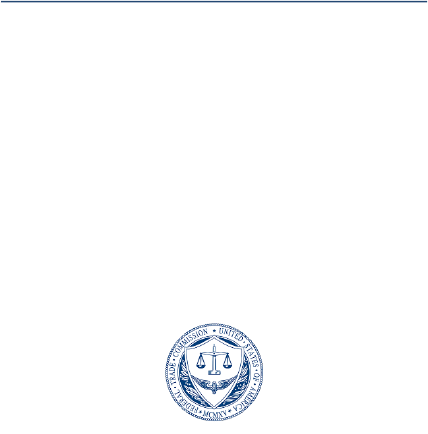
Protecting
Older Consumers
2021–2022
A Report of the Federal Trade Commission
October 18, 2022
FEDERAL TRADE COMMISSION
Lina M. Khan, Chair
Noah Joshua Phillips, Commissioner
Rebecca Kelly Slaughter, Commissioner
Christine S. Wilson, Commissioner
Alvaro M. Bedoya, Commissioner
Contents
I. Introduction ...................................................................................................... 1
II. FTC Enforcement Activities Affecting Older Consumers ........................... 2
A. Enforcement Actions .......................................................................................................3
B. Case Resolutions .............................................................................................................6
C. Other Enforcement Highlights ........................................................................................9
1. Covid-19 Demand Letters ...........................................................................................9
2. Consumer Monetary Relief .......................................................................................11
3. Criminal Liaison Unit ...............................................................................................15
4. Referrals to the FBI’s Recovery Asset Team ...........................................................16
D. FTC Strategies to Provide Additional Tools to Enhance FTC Enforcement Efforts ....18
1. Advance Notice of Proposed Rulemaking on Impersonation of
Government and Business.........................................................................................18
2. Advance Notice of Proposed Rulemaking on Deceptive or
Unfair Earnings Claims.............................................................................................20
3. Advance Notice of Proposed Rulemaking on the Telemarketing Sales Rule ...........21
III. Outreach and Education Activities .............................................................. 22
A. Pass It On Education Campaign ....................................................................................22
B. Outreach Relating to Older Adults ................................................................................23
1. AARP members ........................................................................................................24
2. Senior Medicare Patrol Volunteers ...........................................................................24
3. Members of Congress ...............................................................................................24
4. Consumer Financial Protection Bureau, SAGE, and others .....................................24
5. Older Adult Advocates and Allied Professionals .....................................................24
C. Pandemic Response .......................................................................................................25
IV. Developing Effective Strategies to Protect Older Consumers ................... 26
A. Research and Data Analysis ..........................................................................................26
1. Consumer Sentinel Reports from Older Adults ........................................................27
2. Analysis of Social Security Administration Scam Reports ......................................43
3. Hearing Directly from Older Adults About FTC Impersonators ..............................45
B. Coordinated Efforts to Protect Older Consumers ..........................................................46
V. Conclusion ....................................................................................................... 48
Appendix A - Federal Trade Commission FY 2022 ........................................... 49

FEDERAL TRADE COMMISSION FTC.GOV 1
I. Introduction
The Federal Trade Commission (“FTC” or “Commission”) is the nation’s primary
consumer protection agency and has a broad mandate to protect consumers from unfair and
deceptive acts or practices in the marketplace. Protecting older consumers
1
continues to be one
of the FTC’s top priorities, which it pursues using a multi-pronged approach.
2
First, it files law
enforcement actions to stop unlawful practices and, when possible, return money to consumers.
3
Given the ongoing global health crisis, the FTC continues to focus on schemes that capitalize on
the fears and economic uncertainty of the pandemic to deceptively peddle products related to the
prevention and treatment of COVID-19. This year the FTC also initiated several important
rulemakings on topics impacting older adults to bolster its ability to return money to consumers
in light of the impact of the Supreme Court’s ruling in AMG Capital Management v. FTC.
4
Second, the FTC continues to employ innovative education and outreach campaigns that
reach older adults throughout the country. These important efforts help consumers protect
themselves against emerging frauds and alert them to prevalent consumer protection issues. As
the population of older adults grows, the FTC’s outreach mission to help consumers protect
themselves and their communities becomes increasingly important.
5
1
This report refers to persons 60 and older when using the terms “older adults” or “older consumers” to be
consistent with the requirements in Section 2(1) of the Elder Abuse Prevention and Prosecution Act, which
references Section 2011 of the Social Security Act (42 U.S.C. 1397j(5)) (defining “elder” as an individual age 60 or
older).
2
This report focuses on the Bureau of Consumer Protection’s work to protect older adults. The FTC’s Bureau of
Competition also serves older adults through its work in various sectors of the economy, such as health care,
consumer products and services, technology, manufacturing, and energy. The primary drafters of this staff report are
Michelle Chua, Division of Marketing Practices; Emma Fletcher, Division of Consumer Response and Operations;
and Bridget Small, Division of Consumer and Business Education. Additional acknowledgement goes to Kati
Daffan, Patti Poss, and Patricia Hsue, Division of Marketing Practices; Karen Mandel and Christine DeLorme,
Division of Advertising Practices; Jennifer Leach and Marlena Patterson, Division of Consumer and Business
Education; Shiva Koohi and Michel Grosz, Bureau of Economics; and Summer Law Clerk Tyler Ritchie. This report
reflects the work of staff throughout the Federal Trade Commission’s Bureau of Consumer Protection and its
Regional Offices, with much of the work stemming from the FTC’s Every Community Initiative. Lois C. Greisman
is the FTC’s Elder Justice Coordinator.
3
The FTC has wide-ranging law enforcement responsibilities under the Federal Trade Commission Act, 15 U.S.C. §
41 et seq. and enforces a variety of other laws ranging from the Telemarketing and Consumer Fraud and Abuse
Prevention Act to the Fair Credit Reporting Act. In total, the Commission has enforcement or administrative
responsibilities under more than 70 laws. See http://www.ftc.gov/ogc/stats.shtm
.
4
AMG Capital Mgmt., LLC v. FTC, 593 U. S. ___; 141 S. Ct. 1341 (2021) (holding that Section 13(b) of the FTC
Act does not authorize federal courts to require defendants to refund monies to consumers or give up unjust gains).

FEDERAL TRADE COMMISSION FTC.GOV 2
Finally, the FTC conducts research and collaborates with a diverse array of partners, which
inform the strategies it employs to help ensure that its efforts achieve the maximum benefits for
consumers, including older adults. For example, the FTC’s analysis of fraud and other reports
filed by consumers nationwide helps the agency understand and respond to patterns and trends
related to older adults, including the differences in how older adults in different demographic
populations may experience fraud.
The FTC submits this fifth annual report to the Committees on the Judiciary of the United
States Senate and the United States House of Representatives to fulfill the reporting requirements
of Section 101(c)(2) of the Elder Abuse Prevention and Prosecution Act of 2017.
6
The report
details the FTC’s recent comprehensive efforts to protect older consumers. The report also
includes, pursuant to the law’s requirements, a list in Appendix A of every administrative and
federal district court action filed in the last year that has impacted older adults.
7
II. FTC Enforcement Activities Affecting Older
Consumers
Aggressive law enforcement is a key component in the FTC’s efforts to protect older
consumers. Nearly all FTC enforcement actions involve numerous consumers of all ages, and
while the actual ages of people affected in a given case are not typically known, in the
Commission’s view, older adults are among those affected in every consumer protection case
filed this past fiscal year. Therefore, Appendix A to this report lists all new enforcement actions
brought by the FTC between October 1, 2021, and September 30, 2022. The cases listed in
Appendix A involve a wide range of matters, including allegations regarding money transfer
services, business opportunity and money-making schemes, unsubstantiated product claims, false
claims about COVID-19 treatment or prevention, and more.
8
5
The Census Bureau projects that by 2030 all baby boomers will be older than 65 and “one in every five Americans
is projected to be [at] retirement age.” See Jonathan Vespa, Lauren Medina, and David M. Armstrong, U.S. Dep’t of
Commerce, U.S. Census Bureau, Demographic Turning Points for the United States: Population Projections for
2020 to 2060 (Mar. 2018, Rev. Feb. 2020), at 1, available at
https://www.census.gov/content/dam/Census/library/publications/2020/demo/p25-1144.pdf
.
6
Public Law 115–70, 115th Congress (enacted Oct. 18, 2017).
7
The law requires the FTC Chair to file a report listing the FTC’s enforcement actions “over the preceding fiscal
year in each case in which not less than one victim was an elder or that involved a financial scheme or scam that was
either targeted directly toward or largely affected elders.” Given the large number and broad range of consumers
affected in FTC actions, this report includes, in Appendix A, a list of every administrative and federal district court
action filed in the one-year period.
8
This list includes cases involving violations of children’s privacy laws. The perpetrators of such schemes may not
typically target older adults, but the cases are listed because they involve large and diverse groups of consumers.
The affected consumers may include an older parent or grandparent caring for children who go online and wish to
protect their privacy.

FEDERAL TRADE COMMISSION FTC.GOV 3
This section highlights five enforcement actions filed within the last fiscal year where the
Commission notes a significant impact on older adults. Also listed are additional agency actions
that affected older consumers, including case resolutions, cease and desist demand letters,
consumer refunds, and subsequent criminal action by other agencies relating to FTC matters.
This section also describes the Commission’s issuance of three advance notices of proposed
rulemakings (“ANPRs”), as part of its ongoing efforts and strategies to provide better tools to
enhance its law enforcement efforts. It discusses how the three proposed rulemakings are
relevant to certain critical areas that heavily impact older adults.
A. Enforcement Actions
The Commission filed the following new enforcement actions in the last fiscal year that
likely had a significant impact on older adults:
In Walmart Inc., the FTC sued Walmart for alleged practices that allowed its money
transfer services to be used for fraud.
9
The complaint asserted, among other things, that older
consumers were financially exploited by telemarketing scams that made use of money transfers
from Walmart stores. The FTC complaint alleged,
In many cases, older consumers (ages 65 and older) have been financially exploited by
sending money transfers in connection with common telemarketing scams, such as
grandparent scams,
10
Good Samaritan scams, lottery or prize scams, and romance scams,
from Walmart locations. The average loss suffered by older consumers is usually greater
than for younger consumers. In addition, perpetrators of the scams, or those acting on
their behalf, including fraud rings and money mules, frequently collect the proceeds of
the frauds from Walmart locations, and in some instances, those individuals have even
been employees of Walmart.
The complaint further stated that among all of MoneyGram’s complaints of fraud that involved
Walmart from 2013 to 2018, MoneyGram reported 19,035 complaints about person-in-need or
grandparent scams, more than any other single category. The complaint also alleged that at one
location in Teterboro, New Jersey, 72.6 percent of complaints about fraud-induced transfers
involved the grandparent or emergency scam.
Money transfers have long been a common vehicle for fraud targeting older consumers.
According to the FTC’s complaint, Walmart has been a particularly popular processor for
fraudulent money transfers, in large part because of Walmart’s ineffective, poorly enforced anti-
9
FTC v. Walmart Inc., No. 1:22-cv-3372 (N.D. Ill., filed June 28, 2022) (The Commission vote to file the civil
penalty complaint was 3-2.), available at
https://www.ftc.gov/legal-library/browse/cases-proceedings/182-3012-
walmart-ftc-v.
10
In a “grandparent scam,” the caller pretends that a relative is in distress due to a legal or medical emergency and
asks the victim to send money immediately.

FEDERAL TRADE COMMISSION FTC.GOV 4
fraud policy.
11
The FTC alleged that many of the Walmart staff handling money transfers had
insufficient training or no anti-fraud training at all; Walmart employees were told “If you suspect
fraud, complete the transaction.” Walmart allegedly adopted this practice despite knowing that
once the money transfers were paid out to suspected fraudsters, fraud victims usually could not
get their money back. The FTC is seeking to obtain redress for consumers, as well as
civil penalties.
In Universal Guardian Acceptance, LLC (“UGA”), the FTC brought an action against
defendants that had allegedly serviced and funded payment plans for expensive and often
ineffective investment “trainings.”
12
The case arose out of previously settled litigation against
Online Trading Academy (“OTA”), a company that allegedly targeted older consumers with an
investment trading strategy based on false or unfounded earnings claims.
13
According to the
FTC, OTA had secured payment through the use of short-term, high-interest retail installment
contracts.
14
The FTC alleged that UGA facilitated OTA’s deceptive scheme by underwriting,
funding, and servicing OTA’s retail installment contracts. The FTC further alleged that UGA
ignored red flags that OTA was engaged in deception, including consumer complaints, a high
cancellation rate, and the fact that the vast majority of purchasers were not paying off their debt
within the six month no-interest grace period included in the contracts. The terms of the
settlement required the UGA defendants to offer debt forgiveness to OTA purchasers whose debt
was held by UGA. The settlement also requires the defendants to screen prospective clients that
claim consumers can make money using their products or services, and to monitor such clients’
transactions and business practices.
In Gravity Defyer, the FTC filed suit against a footwear company, claiming that the
company made deceptive pain relief claims about its products.
15
The FTC alleged that the
defendants targeted older adults suffering from arthritis, joint pain, and other medical
conditions.
16
The company claimed in its marketing to offer “clinically proven pain defying
11
Press Release, FTC, FTC Sues Walmart for Facilitating Money Transfer Fraud That Fleeced Customers Out of
Hundreds of Millions (June 28, 2022), available at
https://www.ftc.gov/news-events/news/press-
releases/2022/06/ftc-sues-walmart-facilitating-money-transfer-fraud-fleeced-customers-out-hundreds-millions.
12
FTC v. Universal Guardian Acceptance, LLC, No. 21-8260 (C.D. Cal., filed Oct. 19, 2021), available at
https://www.ftc.gov/legal-library/browse/cases-proceedings/2123021-universal-guardian-acceptance-llc
.
13
FTC v. OTA Franchise Corporation, No. 8:20-cv-287 (C.D. Cal., filed Feb. 12, 2020), available at
https://www.ftc.gov/legal-library/browse/cases-proceedings/182-3175-x200032-online-trading-academy
.
14
Press Release, FTC, Funder and Servicer of Online Trading Academy Payment Plans Will Forgive Debt in
Settlement with FTC (Oct. 21, 2021), available at
https://www.ftc.gov/news-events/news/press-
releases/2021/10/funder-servicer-online-trading-academy-payment-plans-will-forgive-debt-settlement-ftc.
15
FTC v. Gravity Defyer Medical Technology Corporation, No. 1:22-cv-01464 (D.D.C., filed May 25, 2022),
available at https://www.ftc.gov/legal-library/browse/cases-proceedings/1923117-gravity-defyer-ftc-v
.
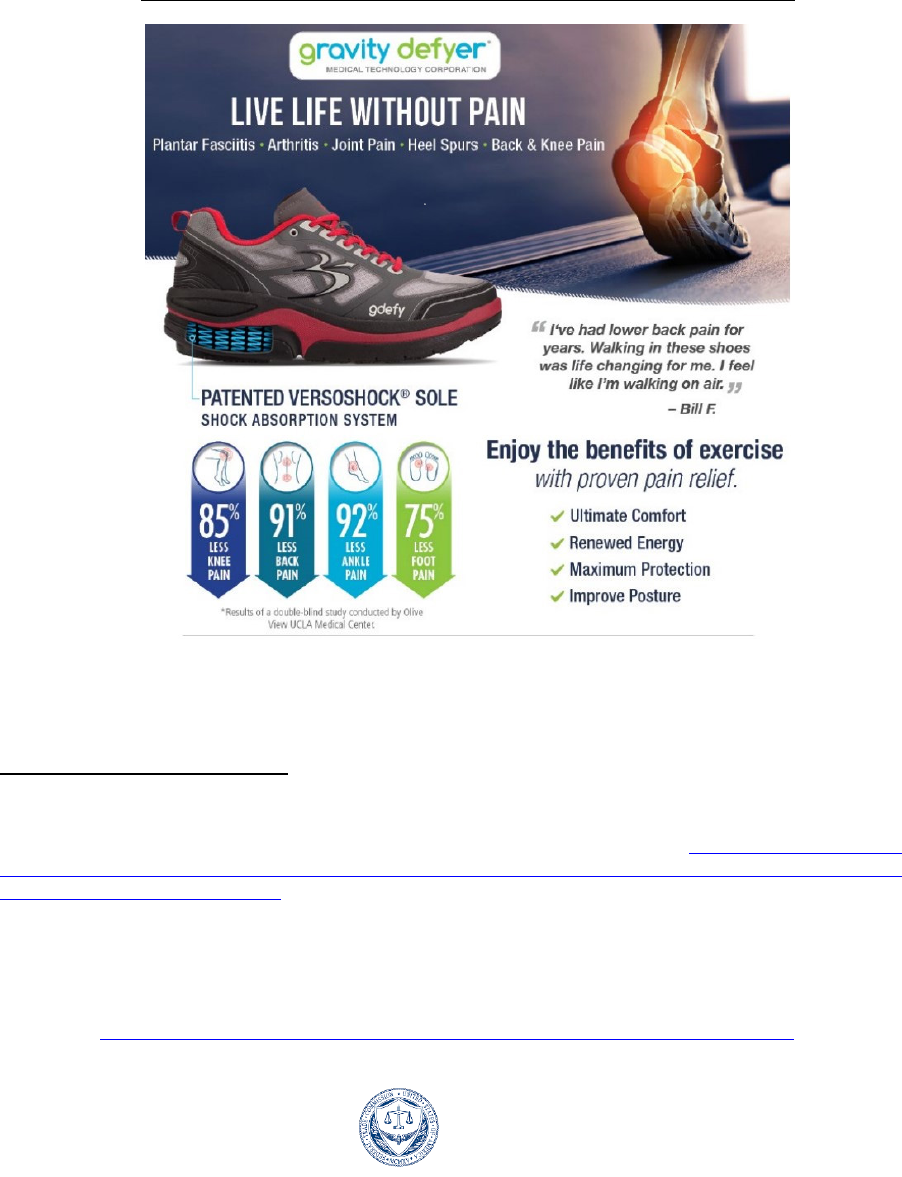
FEDERAL TRADE COMMISSION FTC.GOV 5
footwear,” but the FTC asserted that it lacked competent and reliable scientific evidence to
support such a claim. According to the FTC complaint, the defendants claimed that the unique
technology in the soles of their shoes would relieve knee, back, and foot pain, as well as pain in
people suffering from plantar fasciitis, arthritis, joint pain, and heel spurs. The owner of Gravity
Defyer was previously barred from deceptive advertising by a 2001 FTC order, and the FTC
alleged that the Gravity Defyer advertisements were violations of that order.
Excerpt of Advertisement from Gravity Defyer
17
False claims about COVID-19 treatment and prevention products continue to pose a
threat to the health and finances of older adults.
18
In two instances, the FTC has used its
16
Press Release, FTC, Federal Trade Commission Sues Gravity Defyer and its Owner for Violating FTC Order and
Making Baseless Pain-Relief Claims to Market Footwear (June 7, 2022), available at
https://www.ftc.gov/news-
events/news/press-releases/2022/06/federal-trade-commission-sues-gravity-defyer-its-owner-violating-ftc-order-
making-baseless-pain-relief-claims.
17
FTC v. Gravity Defyer, supra n.15, Complaint ¶ 25, Exhibit B.
18
Not only are older adults more likely to get sick from COVID, they are also more likely to face drastic health-
related consequences as a result. See Center for Disease Control and Prevention Guidance (Updated Aug. 2, 2021),
available at https://www.cdc.gov/coronavirus/2019-ncov/need-extra-precautions/older-adults.html
.

FEDERAL TRADE COMMISSION FTC.GOV 6
authority under the COVID-19 Consumer Protection Act to seek civil penalties in actions against
entities for deceptively pitching products that purported to treat or cure COVID-19.
In Xlear, Inc., the FTC asserted that the defendant falsely marketed its nasal sprays as
effective ways to prevent and treat COVID-19.
19
According to the FTC, Xlear promoted its
sprays by falsely claiming they can provide four hours of protection against infection from the
coronavirus and called them “a simple, safe, and cheap option that could be an effective solution
to the pandemic,” among other claims.
20
Another ad claimed that “Xlear nasal spray provides
additional tested protection for up to four hours, helping keep you and others around you safe.”
The FTC alleged that the defendants’ advertising grossly misrepresented the purported findings
and relevance of several scientific studies. Even after a warning letter from the FTC in 2020 to
stop its unlawful advertising, the defendants continued to make such statements on their website
and social media pages, even modifying or removing the unlawful claims, only to reinstate them
or add additional deceptive statements later, according to the complaint. The lawsuit was filed by
the Department of Justice on the behalf of the FTC and asks for monetary penalties and an order
barring the defendants from making false and unsupported claims.
In B4B Earth Tea LLC, the Department of Justice filed a complaint on behalf of the FTC
and FDA alleging that the defendants had falsely claimed their product was clinically proven to
treat, cure, and prevent COVID-19.
21
According to the complaint, the defendants claimed that
the defendants’ tea, which sells for $60 for a 16-ounce bottle, could cure COVID-19 in 24 to 48
hours.
22
Ads claimed that the tea was completely effective at preventing hospitalization (“100%
effective with 0 side effects”) and specifically claimed that it was better than vaccination
(“Vaccines trial shows preventing hospitalization is 85%-96% while so far Earth Tea Extra
Strength is 100%...”). According to the complaint, those health claims were unsubstantiated
because the single small study cited by the defendants did not meet the standard of competent
and reliable scientific evidence.
B. Case Resolutions
The Commission reached resolution in four pending cases involving older adults in the
last fiscal year.
19
U.S. v. Xlear, Inc., No. 2:21-cv-00640-RJS (D. Utah, filed Oct. 28, 2021), available at https://www.ftc.gov/legal-
library/browse/cases-proceedings/2123045-xlear-inc.
20
Press Release, FTC, FTC Sues Utah-based Company for Falsely Claiming Its Nasal Sprays Can Prevent and
Treat COVID-19 (Oct. 28, 2021), available at
https://www.ftc.gov/news-events/news/press-releases/2021/10/ftc-
sues-utah-based-company-falsely-claiming-its-nasal-sprays-can-prevent-treat-covid-19.
21
U.S. v. B4B Earth Tea LLC, no. 22-CV-1159 (E.D.N.Y., filed Mar. 3, 2022), available at
https://www.ftc.gov/legal-library/browse/cases-proceedings/2223007-b4b-corp
.
22
Press Release, FTC, FTC, DOJ, and FDA Take Action to Stop Marketer of Herbal Tea from Making False
COVID-19 Treatment Claims (Mar. 3, 2022), available at
https://www.ftc.gov/news-events/news/press-
releases/2022/03/ftc-doj-fda-take-action-stop-marketer-herbal-tea-making-false-covid-19-treatment-claims.
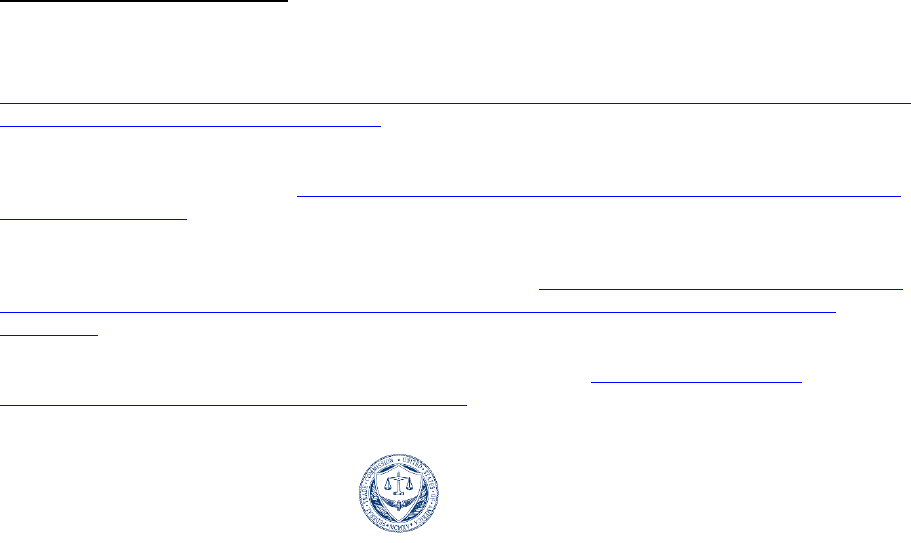
FEDERAL TRADE COMMISSION FTC.GOV 7
In GDP Network LLC, the FTC and the Office of the Attorney General of Florida
reached a settlement with the operators of an alleged credit card interest rate reduction scam.
23
The complaint, filed in July 2020, alleged that the defendants made telemarketing calls in which
they promised to permanently and substantially reduce the consumer’s credit card interest
rates.
24
After posing as representatives or affiliates of consumers’ credit card companies, the
defendants allegedly claimed they could save consumers thousands of dollars in credit card
interest, thereby allowing them to pay off their debt much faster. All these claims were false or
unsubstantiated, according to the complaint. At most, the defendants sometimes opened new
credit card accounts at low introductory rates and transferred consumers’ existing debt to the new
cards. Instead of producing the savings that customers expected, the defendants’ service
allegedly often left people even deeper in debt after they paid upfront fees of between $995 and
$4,995, as well as substantial fees to transfer their existing debt to new cards.
As part of the court
order, the defendants will be permanently banned from the debt relief industry. According to the
complaint, the defendants often targeted financially distressed consumers and older adults.
In RagingBull.com, the FTC reached a settlement with an online stock trading site in a
case filed in December 2020.
25
According to the complaint, the company falsely advised
consumers that by joining its program they could make a substantial income without a lot of
time, money, or experience.
26
The complaint further alleged that the company made it difficult
for consumers to cancel their subscriptions. According to the FTC, consumers lost more than
$197 million in subscription fees for defendants’ services. Those consumers included retirees,
older adults, and immigrants. As part of the stipulated final order, the Raging Bull defendants
were required to pay over $2.4 million, end the earnings deception, get affirmative approval from
customers for subscription sign-ups, and provide them with a simple method to cancel recurring
charges. The FTC is planning to use funds collected in this matter to provide redress to
affected consumers.
23
Press Release, FTC, Operators of Credit Card Interest Rate Reduction Scam Permanently Banned from Debt
Relief Business Under Settlement with the FTC and Florida Attorney General (Feb. 28, 2022), available at
https://www.ftc.gov/news-events/news/press-releases/2022/02/operators-credit-card-interest-rate-reduction-scam-
permanently-banned-debt-relief-business-under.
24
FTC and Office of the Attorney General, State of Florida v. GDP Network LLC, no. 6:20-cv-1192-78DCI (M.D.
Fla., filed July 6, 2020), available at
https://www.ftc.gov/legal-library/browse/cases-proceedings/192-3137-gdp-
network-llc-yf-solution.
25
Press Release, FTC, Online Investment Site to Pay More Than $2.4 Million for Bogus Stock Earnings Claims and
Hard-to-Cancel Subscription Charges (Mar. 8, 2022), available at
https://www.ftc.gov/news-events/news/press-
releases/2022/03/online-investment-site-pay-more-24-million-bogus-stock-earnings-claims-hard-cancel-
subscription.
26
FTC v. RagingBull.com, No. 1:20-cv-3538 (Dec. 7, 2020), available at https://www.ftc.gov/legal-
library/browse/cases-proceedings/2023073-ragingbullcom.

FEDERAL TRADE COMMISSION FTC.GOV 8
In Health Research Laboratories, LLC, the FTC settled an administrative complaint
filed in 2020.
27
The complaint alleged that the respondents marketed their supplements, the
Ultimate Heart Formula, BG18, and Black Garlic Botanicals, as being able to prevent or treat
cardiovascular disease, without appropriate substantiation.
28
The FTC also alleged that
respondents made unsubstantiated claims that their supplement Neupathic could cure, mitigate,
or treat diabetic neuropathy. The settlement banned the companies and their owner from
advertising or selling dietary supplements and from making claims their products treat, cure, or
reduce the risk of disease. In 2017, the owner of the companies and Health Research
Laboratories had settled a previous complaint by the FTC and the State of Maine for deceptive
marketing of health products.
In Electronic Payment Systems (“EPS”), the FTC finalized an order against EPS for
allegedly opening credit card processing merchant accounts for fictitious companies on behalf of
Money Now Funding, a business opportunity scam that the FTC sued in 2013.
29
In the Money
Now Funding case, the FTC alleged that “many victims affected by this scam are seniors with
limited income and savings.”
30
In the FTC’s complaint against EPS, the FTC alleged that by
ignoring warning signs that the merchants were fake, EPS assisted and facilitated Money Now
Funding in laundering more than $4.6 million of consumers’ credit card payments through
different bank accounts for fictitious companies on behalf of the scammers from 2012 to 2013.
31
Under the terms of the settlement order, the respondents are prohibited from providing payment
processing services to any merchant that is, or is likely to be, engaged in deceptive or misleading
conduct, and any merchant that credit card industry monitoring programs have flagged as high-
risk for certain reasons. The respondents are also required to conduct detailed screening of
potential merchants who conduct outgoing telemarketing or are engaged in certain activities that
could harm consumers.
32
27
In the Matter of Health Research Laboratories, LLC, No. 9397 (FTC filed Nov. 13, 2020), available at
https://www.ftc.gov/legal-library/browse/cases-proceedings/x180007-health-research-laboratories-llc-matter
.
28
Press Release, FTC, FTC Finalizes Order Banning Deceptive Marketing by Supplement Seller (June 30, 2022),
available at
https://www.ftc.gov/news-events/news/press-releases/2022/06/ftc-finalizes-order-banning-deceptive-
marketing-supplement-seller?utm_source=govdelivery.
29
Press Release, FTC, Federal Trade Commission Finalizes Order Against Electronic Payment Systems for
Opening Credit Card Merchant Accounts for Fake Companies and Helping a Bogus Business Opportunity (May 24,
2022), available at
https://www.ftc.gov/news-events/news/press-releases/2022/05/federal-trade-commission-
finalizes-order-against-electronic-payment-systems-opening-credit-card.
30
FTC v. Money Now Funding, LLC, No. CV-13-01583-PHX-ROS (D. Ariz., filed Aug. 5, 2013), available at
https://www.ftc.gov/legal-library/browse/cases-proceedings/122-3216-x130063-money-now-funding-llc
.
31
In the Matter of Electronic Payment Systems, LLC, No. C-4764 (FTC filed Mar. 15, 2022), available at
https://www.ftc.gov/legal-library/browse/cases-proceedings/1523213-electronic-payment-systems-matter
.

FEDERAL TRADE COMMISSION FTC.GOV 9
C. Other Enforcement Highlights
Other FTC enforcement highlights during the past fiscal year include the issuance of
cease and desist demand letters, providing consumer redress to consumers in cases previously
brought by the FTC, and criminal action by other agencies that relate to prior FTC matters.
1. Covid-19 Demand Letters
Throughout the pandemic, the FTC has seen many potentially false and unsubstantiated
claims about the treatment or prevention of COVID-19 that exploit consumers’ fear of the
disease and its effects. As mentioned above, COVID-19 has had, and continues to have, a
particularly devastating impact on the health and finances of older Americans. In some
circumstances, to swiftly address troubling claims related to COVID-19, the FTC has sent cease
and desist demand letters to companies and individuals. These letters warn recipients that their
conduct is likely unlawful, and that they can face serious legal consequences, such as a federal
lawsuit and civil penalties, if they do not immediately cease and desist from engaging in
such conduct.
33
Since October 2021, the FTC has sent thirty one cease and desist demand letters to a
range of companies and individuals about potentially false or deceptive advertising or marketing
related to the coronavirus pandemic. Sixteen of these letters were sent jointly with the FDA.
Almost all of the thirty one cease and desist demand letters went to companies allegedly
violating the law by making deceptive or scientifically unsupported claims about their products’
ability to prevent, treat or cure the coronavirus. The unsubstantiated claims included patient
testimonials and references to clinical trials or studies touting the products’ effectiveness against
COVID-19, as described below. Although COVID-19 affects people of all ages, some of the
letters highlighted examples of representations in the companies’ marketing that specifically
related to older adults. For example:
• In November 2021, the FTC sent a cease and desist demand letter to Austin
Compounding Pharmacy based on its promotion of ivermectin and various supplements
to prevent or treat COVID-19.
34
The company made a Facebook post stating “Noone
[sic] needs to die[.] Ivermectin does work.” Another Facebook post described a study of
hospitalized “older patients” with COVID-19 that found that “patients aged 50 and
32
Press Release, FTC, FTC Imposes Restrictions on Electronic Payment Systems for Opening Merchant Accounts
for Fictitious Companies, Assisting a Business Opportunity Scam (Mar. 15, 2022), available at
https://www.ftc.gov/news-events/news/press-releases/2022/03/ftc-imposes-restrictions-electronic-payment-systems-
opening-merchant-accounts-fictitious-companies.
33
Information about the letters sent by the FTC can be found at https://www.ftc.gov/news-
events/features/coronavirus/enforcement/warning-letters.
34
See FTC letter to Austin Compounding Pharmacy (Nov. 4, 2021), available at
https://www.ftc.gov/system/files/warning-letters/cease_and_desist_letter_to_austin_compounding_pharmacy_2021-
11-04_dap.pdf.

FEDERAL TRADE COMMISSION FTC.GOV 10
above” who received vitamin supplements upon admission were less likely to require
oxygen or be admitted to the intensive care unit.
• Also in November 2021, the FTC sent a cease and desist demand letter to Sunshine
Health Foods & Wellness Center challenging its social media claims about the efficacy
of vitamins and supplements in preventing or curing COVID-19.
35
For example, one
Facebook post stated that “School is about to be back in session … immune support is
even more important this year with COVID-19,” and included the text of a previous post
claiming their supplements would keep grandparents healthy.
• In December 2021, the FTC sent a cease and desist demand letter to RhinoSystems Inc.
for its marketing of a nasal irrigation system to prevent and treat COVID-19.
36
The
company sent an email to consumers claiming that a clinical trial had found “individuals
age 55+” who were treated with nasal irrigation were 8.4 times less likely to be
hospitalized or die.
• Also in December 2021, the FTC sent a cease and desist demand letter to TerraMune
Health, LLC, citing its claims about its ViralHalt Supplement, including calling it “A
Natural Covid-19 Vaccine Alternative.”
37
Among other things, the company’s website
provided a testimonial of two customers, identified as aged 76 and 78, reporting that they
contracted COVID-19 and that their use of the company’s supplement “helped our bodies
minimize our symptoms!”
• In February 2022, the FTC sent a cease and desist demand letter to Ohana
Hyperbarics.
38
According to the FTC, the company’s website said that “Research
around the US and Internationally is showing excellent results for those suffering with
COVID-19 being treated with hyperbaric therapy.” One Instagram post shared an article
reporting that a study found that hyperbaric treatment produced relief of COVID-19
symptoms in a group of “predominantly men age 30 to 79.”
35
See FTC letter to Sunshine Health Foods & Wellness Center (Nov. 4, 2021), available at
https://www.ftc.gov/system/files/warning-letters/cease_and_desist_letter_to_sunshine_health_food_2021-11-
04_dap.pdf.
36
See FTC letter to RhinoSystems Inc. (Dec. 14, 2021), available at https://www.ftc.gov/system/files/warning-
letters/cease_and_desist_letter_to_rhinosystems_2021-12-14_dap.pdf.
37
See FTC letter to TerraMune Health, LLC (Dec. 20, 2021), available at https://www.ftc.gov/system/files/warning-
letters/warning_letter-dap-terramune.pdf.
38
See FTC letter to Ohana Hyperbarics (Feb. 22, 2022), available at
https://www.ftc.gov/system/files/ftc_gov/pdf/2022-02-22%20DAP%20Ohana%20Hyperbarics.pdf
.

FEDERAL TRADE COMMISSION FTC.GOV 11
2. Consumer Monetary Relief
In the last fiscal year, FTC enforcement actions have resulted in relief of more than $462
million to consumers of all ages.
39
Although the FTC’s ability to seek monetary relief for harmed
consumers is now substantially limited following the Supreme Court’s decision in AMG Capital
Mgmt.,
40
the FTC continues to deliver refunds to consumers when possible. These payments
provide people some recompense for the losses that occurred due to illegal conduct.
In October 2021, the FTC began sending payments totaling $1.1 million to consumers
who had paid for a business opportunity scheme called 8 Figure Dream Lifestyle.
41
According
to the FTC, the company used a combination of illegal robocalls, live telephone calls, text
messaging, internet ads, emails, social media, and live events to market and sell consumers
fraudulent money-making opportunities. The FTC alleged that the defendants made false or
unsubstantiated claims in their marketing about how much consumers could earn using their
programs. According to the FTC complaint, the defendants “directly targeted older consumers
who may need extra money for living expenses or retirement.”
42
During one webinar, defendants
targeted retirees with the tagline “Make sure those golden years are actually ‘Golden’!”
Later in October 2021, the FTC began sending checks totaling nearly $300,000 to people
who paid Elite IT Partners Inc. for unnecessary computer repair services.
43
According to the
FTC, the company’s telemarketers claimed consumers’ computers and personal information
were in imminent danger, and convinced many consumers to pay large sums for immediate
cleaning of their computers, antivirus software, and ongoing technical support services. The
complaint asserted that “the vast majority of consumers Elite contacts are elderly and/or
unfamiliar with the workings of computers or the internet. Defendants use intimidation and scare
tactics to take advantage of these consumers’ limited knowledge about such technology.”
44
39
The FTC provides updated statistics about where refunds were sent, the dollar amounts refunded, and the number
of people who benefited from FTC refund programs at www.ftc.gov/refunds
.
40
AMG Capital Mgmt., 141 S. Ct. at 1341. See also discussion in Section II(D) below.
41
Press Release, FTC, FTC Returns $1.1 Million to Consumers Who Lost Money to Alleged Scammers Selling
Bogus Income Opportunities (Oct. 4, 2021), available at
https://www.ftc.gov/news-events/news/press-
releases/2021/10/ftc-returns-11-million-consumers-who-lost-money-alleged-scammers-selling-bogus-income-
opportunities.
42
FTC v. 8 Figure Dream Lifestyle LLC, No. 8:19-cv-01165-AG-KES (C.D. Cal., filed June 12, 2019), available at
https://www.ftc.gov/legal-library/browse/cases-proceedings/182-3117-8-figure-dream-lifestyle-llc
.
43
Press Release, FTC, FTC Sends Refunds Totaling Nearly $300,000 to People who Lost Money to a Tech Support
Scheme (Oct. 12, 2021), available at
https://www.ftc.gov/news-events/news/press-releases/2021/10/ftc-sends-
refunds-totaling-nearly-300000-people-who-lost-money-tech-support-scheme.
44
FTC v. Elite IT Partners, Inc., No. 2:19-cv-00125-RJS (D. Utah, filed Feb. 25, 2019), available at
https://www.ftc.gov/legal-library/browse/cases-proceedings/182-3114-elite-it-partners-inc
.

FEDERAL TRADE COMMISSION FTC.GOV 12
Also in October 2021, the FTC sent checks worth more than $1.1 million to consumers
who purchased the supplements Neurocet, Regenify, and Resetigen-D from five related
companies including Mile High Madison Group, Inc.
45
The FTC alleged that the companies
who marketed those supplements deceptively promoted their products using false or
unsubstantiated claims that the supplements could stop pain and treat age-related ailments. For
example, the complaint asserted that the defendants made false or unsubstantiated claims that
their supplements could “repair or reverse age-related damage in human cells” and “repair or
reverse all age-related health conditions,” including improving memory and brain function, and
eliminate or significantly reduce arthritis and bone, joint, and muscle pain.
46
In November 2021, consumers who purchased certain publications from Agora
Financial LLC received full refunds totaling more than $2 million as the result of a stipulated
final order.
47
According to the FTC, the defendants convinced consumers to buy pamphlets,
newsletters, and other publications through false promises and deceptive marketing. The refunds
provided full compensation for consumers who bought certain publications. The FTC alleged
that the defendants falsely marketed one publication as providing a clinically proven protocol
that can permanently cure type 2 diabetes and falsely promised that another book would show
consumers how to claim hundreds of thousands of dollars from the government. According to the
FTC, the defendants primarily targeted their publications at older consumers nationwide. The
defendants’ marketing included testimonials purporting to be from an 88-year-old retiree and a
73-year-old retiree who had each made thousands of dollars.
48
In December 2021, the FTC sent checks totaling more than $1.8 million to people who
were charged by Lifewatch Inc. for products that were advertised as free.
49
The FTC joined with
the Florida Attorney General’s Office to assert that the defendants had made at least one billion
robocalls to pitch medical alert systems available to senior citizens “at no cost whatsoever.” The
45
Press Release, FTC, FTC Sends Refunds to Consumers Who Bought Deceptively Marketed Supplements to Treat
Pain and Age-related Health Conditions (Oct. 20, 2021), available at
https://www.ftc.gov/news-events/news/press-
releases/2021/10/ftc-sends-refunds-consumers-who-bought-deceptively-marketed-supplements-treat-pain-age-
related.
46
FTC v. Mile High Madison Group, Inc., No. 1:20-cv-21622-FAM (S.D. Fla., filed Apr. 17, 2020), available at
https://www.ftc.gov/legal-library/browse/cases-proceedings/172-3132-172-3143-nordic-clinical-inc-encore-plus-
solutions-inc.
47
Press Release, FTC, FTC Sends Full Refunds Totaling Over $2 Million to Consumers who Lost Money Through
Deceptive Direct Mail Publications Scheme (Nov. 2, 2021), available at
https://www.ftc.gov/news-
events/news/press-releases/2021/11/ftc-sends-full-refunds-totaling-over-2-million-consumers-who-lost-money-
through-deceptive-direct.
48
FTC v. Agora Financial, LLC, No. 1:19-cv-03100-JMC (D. Md., filed Oct. 24, 2019), available at
https://www.ftc.gov/legal-library/browse/cases-proceedings/182-3116-agora-financial-llc
.
49
Press Release, FTC, FTC Issues Refunds Totaling More Than $1.8 Million to Consumers Defrauded by Lifewatch,
Inc.’s Deceptive Medical Alert Telemarketing Scheme (Dec. 1, 2021), available at
https://www.ftc.gov/news-
events/news/press-releases/2021/12/ftc-issues-refunds-totaling-more-18-million-consumers-defrauded-lifewatch-
incs-deceptive-medical.

FEDERAL TRADE COMMISSION FTC.GOV 13
messages allegedly claimed that the system was endorsed or recommended by reputable
organizations like the American Heart Association. According to the FTC, consumers eventually
learned that they were responsible for monthly fees and that it was difficult to cancel without
paying a penalty.
The complaint alleged that “Many of the consumers who receive these
unsolicited calls are elderly, live alone, and have limited or fixed incomes. They often are in poor
health, suffer from memory loss or dementia, and rely on family members, friends, or health
professionals to manage their finances and to make financial or health related decisions for
them.”
50
Also in December 2021, the FTC sent a second round of checks totaling more than $6.5
million to people who lost money to an alleged debt relief scam orchestrated by Helping
America Group.
51
The FTC first sent payments to affected consumers in July 2020. In total, the
agency has mailed more than $20 million to consumers in this matter. According to a complaint
by the FTC and the State of Florida, the defendants tricked consumers into paying hundreds of
thousands of dollars per month under the false pretense that defendants would pay, settle, or
obtain dismissals of customers’ debts and improve their credit.
52
The complaint alleged that the
affected consumers carried significant debt and included the elderly and disabled.
In February 2022, the FTC began sending checks to consumers who had purchased
indoor TV antennas or signal amplifiers from Wellco, Inc.
53
The refunds total more than
$580,000. The FTC alleged that the defendants had made deceptive performance claims and used
deceptive consumer endorsements and web pages that looked like objective news reports to
market their products. According to the complaint, the defendants claimed that their antennas
would enable some consumers to receive one hundred or more premium channels in HD and that
users of the antennas and related amplifiers would receive cable or subscription channels like
HBO and AMC.
54
One of their advertisements was titled “New York: Seniors Are Taking
Advantage of New 2018 Rule That Allows Americans To Get FREE TV In HD, Causing
Millions To Cancel Cable.”
50
FTC and State of Florida, Office of the Attorney General v. Lifewatch Inc., No. 1:15-cv-05781 (N.D. Ill., filed
June 30, 2015), available at
https://www.ftc.gov/legal-library/browse/cases-proceedings/152-3216-x160047-life-
management-services-inc.
51
Press Release, FTC, Helping America Group Refunds (Dec. 2021), available at
https://www.ftc.gov/enforcement/refunds/helping-america-group-refunds
.
52
FTC and State of Florida v. Jeremy Lee Marcus, No. 0:17-cv-60907-CMA (S.D. Fla., filed May 8, 2017),
available at
https://www.ftc.gov/legal-library/browse/cases-proceedings/162-3125-x170037-jeremy-lee-marcus-et-
al.
53
Press Release, FTC, FTC Sending Refunds to Consumers who Bought Deceptively Marketed Indoor TV Antennas
and Signal Amplifiers from Wellco, Inc. (Feb. 18, 2022), available at
https://www.ftc.gov/news-events/news/press-
releases/2022/02/ftc-sending-refunds-consumers-who-bought-deceptively-marketed-indoor-tv-antennas-signal-
amplifiers.
54
FTC v. Wellco, Inc., No. 1:21-cv-02081 (S.D.N.Y., filed Mar. 10, 2021), available at https://www.ftc.gov/legal-
library/browse/cases-proceedings/192-3004-wellco-inc-ftc-v.

FEDERAL TRADE COMMISSION FTC.GOV 14
In April 2022, the FTC returned more than $23 million in redress to consumers who were
allegedly defrauded by a business coaching scheme based out of Malaysia called My Online
Business Education, or MOBE Ltd.
55
The defendants made allegedly false claims that MOBE
would enable its members to start their own online businesses and earn substantial income
quickly and easily using a “proven” 21-step system. The FTC asserted that the defendants’
international operation targeted U.S. consumers—including service members, veterans, and older
adults—through online ads, social media, direct mailers, and live events held throughout the
country. According to the complaint, the defendants created and promoted a system called the
“Ultimate Retirement Breakthrough,” a re-branded version of the 21-step system aimed at older
adults and retirees.
56
A banner advertisement touted it as “The Surefire Way To Create A Six-
Figure Retirement Income In Less Than 12 Months.”
Later in April 2022, the FTC sent checks totaling $423,000 to consumers who had
purchased the purported anti-aging pill ReJuvenation from Quantum Wellness Botanical
Institute, LLC and filed a valid claim with the FTC.
57
The FTC first sent refunds to consumers
in June 2020. In total, the agency has mailed more than $556,000 to consumers in this matter.
According to the FTC, the defendants marketed the pill as a cure-all for a range of age-related
ailments, including cell damage, heart attack damage, brain damage, and deafness.
58
For
example, one challenged advertisement for ReJuvenation stated: “Flood your body with youth
hormones … NATURALLY! Increase your HGH up to 682% … Stunning age reversal study:
Stem cells boost life span three-fold … Repair every aging cell in your body—damaged tissues
and organs, too! Visibly fade wrinkles overnight.”
59
Another challenged advertisement stated
ReJuvenation would: “Rejuvenate every tissue, organ and gland of the body to levels you
enjoyed when you were young … Improve your skin’s elasticity and tone, thereby reducing
wrinkles, furrows and lines … Dramatically boost memory and mental clarity … Slow down or
even halt aspects of the normal aging process.”
55
Press Release, FTC, Federal Trade Commission Returns More Than $23 Million To Consumers Deceived by
Online Business Coaching Scheme MOBE (Apr. 5, 2022), available at
https://www.ftc.gov/news-events/news/press-
releases/2022/04/federal-trade-commission-returns-more-23-million-consumers-deceived-online-business-coaching-
scheme.
56
FTC v. MOBE Ltd., No. 6:18-cv-862-Orl-37DCI (M.D. Fla., filed June 4, 2018), available at
https://www.ftc.gov/legal-library/browse/cases-proceedings/172-3072-mobe-ltd-et-al
.
57
Press, Release, FTC, ReJuvenation Refunds (April 2022), available at
https://www.ftc.gov/enforcement/refunds/rejuvenation-refunds
.
58
Press Release, FTC, FTC Sending Refund Checks Totaling Almost $149,000 to Consumers Who Bought
ReJuvenation “Anti-Aging” Pill (June 1, 2020), available at
https://www.ftc.gov/news-events/news/press-
releases/2020/06/ftc-sending-refund-checks-totaling-almost-149000-consumers-who-bought-rejuvenation-anti-
aging-pill.
59
FTC v. Quantum Wellness Botanical Institute, LLC, No. 2:20-cv-00244-SMB (D. Ariz., filed Feb. 3, 2020),
available at
https://www.ftc.gov/legal-library/browse/cases-proceedings/172-3131-quantum-wellness-botanical-
institute-llc.

FEDERAL TRADE COMMISSION FTC.GOV 15
In July 2022, the FTC began sending refunds to consumers who were allegedly defrauded
by the Next-Gen sweepstakes scam.
60
The FTC is sending almost $25 million to affected
consumers in dozens of countries, including more than $18 million to U.S. consumers.
According to the complaint filed jointly by the FTC and the State of Missouri, the defendants
sent tens of millions of deceptive personalized mailers to consumers around the world since
2013. The defendants’ mailers allegedly falsely told recipients they had won or were likely to
win a substantial cash prize, as much as $2 million, in exchange for a fee ranging from $9.00 to
$139.99. The FTC alleged that many consumers paid the defendants several times before
realizing they had been scammed. According to the complaint, many of the victims were
elderly consumers.
61
3. Criminal Liaison Unit
The FTC’s Criminal Liaison Unit works with federal and state criminal prosecutors to
better address consumer fraud.
62
Notably, in November 2021, the Commission issued a policy
statement to enhance its efforts to combat the criminal misconduct it uncovers in its consumer
protection and antitrust investigations.
63
Through this work, prosecutors have brought criminal
cases built on facts the FTC exposed in bringing its civil law enforcement actions.
For example, in March 2022, former FTC defendant Travis Peterson was sentenced to
nearly three and a half years (41 months) in prison for a fraudulent charity scheme that targeted
older adults.
64
Peterson’s operation made millions of robocalls asking for donations and falsely
claiming those donations were tax-deductible and would benefit veterans’ charities.
65
The FTC’s
60
Press Release, U.S. Federal Trade Commission Returning Almost $25 Million to Consumers Worldwide Who
Were Defrauded by Next-Gen Sweepstakes Scheme (July 19, 2022), available at
https://www.ftc.gov/news-
events/news/press-releases/2022/07/us-federal-trade-commission-returning-almost-25-million-consumers-
worldwide-who-were-defrauded-next?utm_source=govdelivery.
61
FTC and State of Missouri ex rel. Hawley v. Next-Gen, Inc., No. 4:18-CV-00128-DGK (W.D. Mo., filed Sept. 24,
2018), available at https://www.ftc.gov/legal-library/browse/cases-proceedings/172-3133-x180023-next-gen-inc
.
62
Information about the FTC’s Criminal Liaison Unit is available at https://www.ftc.gov/enforcement/criminal-
liaison-unit.
63
Commission Statement Regarding Criminal Referral and Partnership Process (Nov. 18, 2021), available at
https://www.ftc.gov/system/files/documents/public_statements/1598439/commission_statement_regarding_criminal
_referrals_and_partnership_process_updated_p094207.pdf.
64
Press Release, U.S. Department of Justice, Utah Man who Operated Fraudulent Veteran Charities Sentenced to
Federal Prison (Mar. 29, 2022), available at
https://www.justice.gov/usao-ndga/pr/utah-man-who-operated-
fraudulent-veteran-charities-sentenced-federal-prison.
65
Press Release, FTC, FTC Crackdown Stops Operations Responsible for Billions of Illegal Robocalls (March 26,
2019), available at
https://www.ftc.gov/news-events/news/press-releases/2019/03/ftc-crackdown-stops-operations-
responsible-billions-illegal-robocalls.

FEDERAL TRADE COMMISSION FTC.GOV 16
action against Peterson was part of Operation Donate with Honor, a state-and-federal sweep
combating fraudulent charities that claimed to help veterans and servicemembers.
66
In 2022, Maricopa County Attorney’s Office in Arizona obtained guilty pleas against
David Johnson and Brandon Randis, and sentenced Johnson to five years in prison, for their roles
in a telemarketing scheme that targeted older adults, among others.
67
The FTC previously sued
the ringleaders of this operation, which tricked consumers into purchasing ecommerce websites
through false promises of substantial income and a money-back guarantee.
68
The FTC obtained
more than $7 million in redress for consumers through the civil case.
69
Maricopa County has
obtained a total of 13 pleas in this criminal case to date, and the case is ongoing against the
remaining defendants, including the former-FTC-defendant ringleaders.
Following extradition from Costa Rica, Jamaican nationals Derrick Levy and Maurice
Levy pled guilty in January and June of 2022, respectively, for running a telemarketing scam
targeting older adults in the United States.
70
The scammers contacted their elderly victims by
telephone and falsely claimed the individuals had won sweepstakes prizes, sometimes even
impersonating FTC officials, to induce the victims to send “fees” in order to claim their prizes.
71
The FTC provided assistance to DOJ in this case.
4. Referrals to the FBI’s Recovery Asset Team
Since 2019, the FTC has referred reports involving high dollar losses to the Federal
Bureau of Investigations (“FBI”) Internet Crime Complaint Center (IC3) Recovery Asset Team.
This team’s goal is to “streamline communication with financial institutions and assist FBI field
offices with the freezing of funds for victims who made transfers to domestic accounts under
66
Press Release, FTC, FTC and States Combat Fraudulent Charities That Falsely Claim to Help Veterans and
Servicemembers (July 19, 2018), available at
https://www.ftc.gov/news-events/news/press-releases/2018/07/ftc-
states-combat-fraudulent-charities-falsely-claim-help-veterans-servicemembers.
67
Maricopa County Criminal Court Case Information (accessed July 5, 2022), available at
http://www.superiorcourt.maricopa.gov/docket/CriminalCourtCases/caseInfo.asp?caseNumber=CR2019-006125
.
68
Press Release, FTC, Business Opportunity Scheme Operators Banned from Telemarketing and Selling Investment
Opportunities; Will Return Millions to Consumers (Mar. 13, 2017), available at
https://www.ftc.gov/news-
events/press-releases/2017/03/business-opportunity-scheme-operators-banned-telemarketing.
69
Press Release, FTC, FTC to Send Refund Checks to Consumers who Lost Money in Business Opportunity
Telemarketing Scam (Mar. 5, 2019), available at
https://www.ftc.gov/news-events/press-releases/2019/03/ftc-send-
refund-checks-consumers-who-lost-money-business.
70
Press Release, U.S. Department of Justice, Two Men Plead Guilty to International Telemarketing Sweepstakes
Fraud Scheme (June 30, 2022), available at
https://www.justice.gov/opa/pr/two-men-plead-guilty-international-
telemarketing-sweepstakes-fraud-scheme.
71
Indictment, United States v. Levy, et al., Case No. 3:14-cr-143 (W.D.N.C. Aug. 5, 2014), available at
https://www.justice.gov/criminal-fraud/file/1395791/download
.

FEDERAL TRADE COMMISSION FTC.GOV 17
fraudulent pretenses.”
72
The FTC refers reports received through its website and call center that
meet certain criteria (typically larger dollar losses) to the FBI IC3 Recovery Asset Team when
the consumer agrees to the referral. In the past year, the FTC has referred over 700 reports
through its Consumer Sentinel Network to the FBI IC3’s Recovery Asset Team for review and
potential action.
In 2021, the FBI IC3 Recovery Asset Team responded to 1,726 incidents and froze an
impressive $328.32 million of the $443.48 million reported losses, making recovery possible for
many victims.
73
Here are some recent success stories shared by the FBI IC3 Recovery
Asset Team:
• In June 2022, an elder victim reported to the FTC that the victim had been contacted by
an individual claiming to be from customer support at the victim’s bank. The subject then
instructed the victim to complete a wire transfer to a fraudulent domestic account in order
to “save their money.” Since the victim reported the incident quickly, the FBI IC3
Recovery Asset Team was able to contact the recipient bank and freeze the full wired
amount of almost $100,000 for possible recovery.
• In May 2022, an elder victim reported to the FTC that the victim had been contacted by
an individual claiming to be from McAfee Anti-Virus, claiming that their protection plan
was due to update. The victim called the number contained in the spoofed email and gave
the victim’s bank account access to the subject, where the subject then initiated a wire
transfer for almost $50,000. Again, since the victim reported the incident quickly, the FBI
IC3 Recovery Asset Team was able to contact the recipient bank and freeze the full wired
amount for possible recovery.
• Also in May 2022, an elder victim reported to the FTC that the victim had been contacted
by an individual claiming to be from Amazon Support. The subject claimed that the
victim had a fraudulent purchase on their account and threated they would be arrested if
they did not complete a wire transfer in order to “protect their money.” The victim
completed a wire to a fraudulent domestic account of almost $100,000. The FBI IC3
Recovery Asset Team was able to contact the recipient bank and freeze a majority of the
funds for possible recovery.
The FTC is proud to partner with the FBI IC3’s Recovery Asset Team to help consumers,
particularly those experiencing large dollar losses, recover funds when possible.
72
Federal Bureau of Investigation Internet Crime Report 2021, Dept of Justice Federal Bureau of Investigation
(2021) at 10 available at https://www.ic3.gov/Media/PDF/AnnualReport/2021_IC3Report.pdf
.
73
Id. at 11.

FEDERAL TRADE COMMISSION FTC.GOV 18
D. FTC Strategies to Provide Additional Tools to Enhance
FTC Enforcement Efforts
In the past fiscal year, the FTC focused on developing additional tools to enhance its law
enforcement efforts. These efforts were made in part as a result of a 2021 United States Supreme
Court ruling in AMG Capital Mgmt., which held, among other things, that the FTC did not have
authority to seek equitable monetary relief in cases brought under Section 13(b) of the FTC
Act.
74
Prior to this ruling, the FTC had used its Section 13(b) authority to provide billions of
dollars in monetary restitution to consumers affected by unfair or deceptive acts or practices,
including older adults.
75
Following the AMG decision, the Commission is constrained in its
ability to obtain redress for consumers and has sought to increase the tools at its disposal to do
so. While additional tools to enhance the FTC’s enforcement efforts would affect all
consumers,
76
the particular initiatives described below apply to deceptive or unfair practices that
often disproportionately impact older adults, among other population segments.
1. Advance Notice of Proposed Rulemaking on Impersonation of
Government and Business
In December 2021, the FTC issued an Advance Notice of Proposed Rulemaking to
address deceptive or unfair acts or practices relating to impersonation fraud (“Impersonation
ANPR”).
77
The proposed rulemaking is aimed at combatting government and business
impersonation fraud, a pernicious problem that has grown worse during the pandemic.
78
74
AMG Capital Mgmt., LLC v. FTC, 141 S. Ct. 1341 (2021).
75
15 U.S.C. § 53(b). From FY 2017 to 2021, the Commission returned $11.4 billion to consumers across all FTC
cases, including those brought solely under the FTC’s Section 13(b) authority.
76
In addition to the Commission’s rulemaking efforts, the FTC has also revitalized its authority to put bad actors on
notice that their conduct violates the FTC Act by sending them a Notice of Penalty Offenses. These notices outline
a number of practices that the Commission has previously found to be unfair or deceptive and highlight that
engaging in this conduct could lead to civil penalties. See, e.g., Press Release, FTC, FTC Targets False Claims by
For-Profit Colleges (Oct. 6, 2021), available at
https://www.ftc.gov/news-events/news/press-releases/2021/10/ftc-
targets-false-claims-profit-colleges.
77
Trade Regulation Rule on Impersonation of Government and Businesses, 86 Fed. Reg. 72901 (Dec. 23, 2021),
available at
https://www.federalregister.gov/documents/2021/12/23/2021-27731/trade-regulation-rule-on-
impersonation-of-government-and-businesses. The FTC unanimously approved the ANPR earlier in December
2021. See Press Release, FTC, FTC Launches Rulemaking to Combat Sharp Spike in Impersonation Fraud (Dec. 16,
2021), available at https://www.ftc.gov/news-e
vents/news/press-releases/2021/12/ftc-launches-rulemaking-combat-
sharp-spike-impersonation-fraud.
78
Press Release, FTC, FTC Launches Rulemaking to Combat Sharp Spike in Impersonation Fraud. “The COVID-19
pandemic has spurred a sharp spike in impersonation fraud, as scammers capitalize on confusion and concerns
around shifts in the economy stemming from the pandemic. Incorporating new data from the Social Security
Administration, reported costs have increased an alarming 85 percent year-over year, with $2 billion in total losses
between October 2020 and September 2021. Notably, since the pandemic began, COVID-specific scam reports have
included 12,491 complaints of government impersonation and 8,794 complaints of business impersonation.”

FEDERAL TRADE COMMISSION FTC.GOV 19
Government and business impersonators can take many forms, posing as government officials or
representatives from well-known businesses or charities, for example. The perpetrators of
impersonation fraud commonly seek monetary payment or information that they can use to
commit identity theft.
Government impersonators often pretend to represent institutions such as the Social
Security Administration, Medicare/Health and Human Services, IRS, or law enforcement, and
may threaten their targets with a discontinuation of government benefits, enforcement of tax
liability, and even arrest or prosecution. Business impersonators may claim there is suspicious
activity on a customer’s account or offer a refund or prize if the victim will provide some
personal information. According to the FTC, the most common type of government
impersonation fraud involved the Social Security Administration, with more than 308,000
complaints between 2017 and 2021, more than twice the number of the next type.
79
As discussed
in Section IV, analysis of the FTC reports shows older adults reported tremendous losses to
impersonation scams, topping $151 million for business impersonation scams and $122 million
for government impersonation scams in 2021.
With the Impersonation ANPR, the FTC seeks to determine if a Trade Regulation Rule
targeting deceptive or unfair impersonation practices is warranted. The ANPR noted that while
the FTC in the past has brought many cases relating to impersonation under different authorities,
it is currently limited in its remedial authority,
80
and solicited comment on whether the FTC
should propose a rule that could more comprehensively outlaw government and business
impersonation.
81
The ANPR also sought comment on the prevalence of impersonation schemes,
the costs and benefits of a rule to address them, and alternative or additional actions, such as
publication of educational materials and hosting of public workshops. On September 15, 2022,
79
Trade Regulation Rule on Impersonation of Government and Businesses, 86 Fed. Reg. 72901, 72902. “From
January 1, 2017 through September 30, 2021, consumers reported 1,362,996 instances of government impersonation
and associated total losses of roughly $922,739,109.
The most common such schemes involved Social Security
Administration (SSA) impersonators, with more than 308,000 complaints alleging SSA impersonation, followed by
the IRS (124,000) and Health and Human Services/Medicare programs (125,000).”
80
See, e.g., Trade Regulation Rule on Impersonation of Government and Businesses, 86 Fed. Reg. 72901, 72902
(“Although the Commission has brought many cases involving impersonator scams under Section 5 of the FTC
ACT, 15 U.S.C. 45, its current remedial authority is limited. The U.S. Supreme Court recently held that equitable
monetary relief, including consumer redress, is not available under Section 13(b) of the FTC Act.”).
81
Trade Regulation Rule on Impersonation of Government and Businesses, 86 Fed. Reg. 72901, 72903. “Both the
Mortgage Assistance Relief Services (MARS) Rule and the Telemarketing Sales Rule (TSR) already proscribe
impersonation involving false government and business (including nonprofit) affiliation and endorsement claims ….
An impersonator rule that builds on the existing sector- and method-specific rules could more comprehensively
outlaw government and business impersonation. By focusing on practices that are the subject of its law enforcement
experience and the subject of consumer fraud reports, the Commission anticipates streamlining this proposed
rulemaking for the benefit of consumers.”

FEDERAL TRADE COMMISSION FTC.GOV 20
the Commission approved a Notice of Proposed Rulemaking addressing impersonation of
government and businesses.
82
2. Advance Notice of Proposed Rulemaking on Deceptive or Unfair
Earnings Claims
In March 2022, the FTC issued an Advance Notice of Proposed Rulemaking to address
deceptive or unfair earnings claims (“Earnings Claims ANPR”).
83
This ANPR is aimed at
misleading earnings claims, which both deprive consumers of the ability to make informed
decisions and unfairly advantage bad actors in the marketplace at the expense of
honest businesses.
84
As prior FTC cases demonstrate, sales pitches containing deceptive earnings claims can
appeal to retirees and older adults living on fixed incomes who are looking to supplement their
income.
85
The FTC has taken aggressive law enforcement action related to earnings claims made
by targets engaged in coaching or mentoring schemes, multi-level marketing companies, work-
from-home, e-commerce, or other business opportunity scams, chain referral schemes, gig
companies and employers, job scams, and businesses purporting to offer educational
opportunities. However, despite the FTC’s aggressive enforcement program, deceptive earning
claims continue to proliferate in the marketplace.
86
The FTC anticipates that a rule prohibiting the use of misleading earnings claims would
enhance deterrence and help the FTC move quickly to stop illegal conduct. Such a rule may also
further clarify for businesses what constitutes a deceptive earnings claim. In addition, a rule
would enable the FTC to seek monetary relief for consumers harmed by deceptive earnings
82
Press Release, FTC, FTC Proposes New Rule to Combat Government and Business Impersonation Scams (Sept.
15, 2022), available at
https://www.ftc.gov/news-events/news/press-releases/2022/09/ftc-proposes-new-rule-
combat-government-business-impersonation-scams.
83
Deceptive or Unfair Earnings Claims, 87 Fed. Reg. 13951 (Mar. 11, 2022), available at
https://www.federalregister.gov/documents/2022/03/11/2022-04679/deceptive-or-unfair-earnings-claims#. The FTC
unanimously approved the ANPR in February 2022. Press Release, FTC, FTC Takes Action to Combat Bogus
Money-Making Claims Used to Lure People into Dead-end Debt Traps (Feb. 17, 2022), available at
https://www.ftc.gov/news-events/news/press-releases/2022/02/ftc-takes-action-combat-bogus-money-making-
claims-used-lure-people-dead-end-debt-traps.
84
The Earnings Claims ANPR follows the Commission’s announcement of a new Notice of Penalty Offenses
Concerning Money-Making Opportunities in October 2021. The Commission served this notice on more than 1,100
businesses, putting them on notice that if they deceive or mislead consumers about potential earnings, they could be
subject to civil penalties. Press Release, FTC, FTC Puts Business on Notice that False Money-Making Claims Could
Lead to Big Penalties (Oct. 26, 2021), available at
https://www.ftc.gov/news-events/news/press-
releases/2021/10/ftc-puts-businesses-notice-false-money-making-claims-could-lead-big-penalties.
85
Deceptive or Unfair Earnings Claims, 87 Fed. Reg. 13951, 13952–53 n.23–33 (citing FTC v. OTA Franchise
Corp., FTC v. Ragingbull.com, FTC v. Mobe Ltd., FTC v. 8 Figure Dream Lifestyle LLC, among others).
86
Deceptive or Unfair Earnings Claims, 87 Fed. Reg. 13951, 13952.

FEDERAL TRADE COMMISSION FTC.GOV 21
claims, as well as civil penalties against those who make the deceptive claims. The FTC has
previously promulgated rules regulating the use of earnings claims in certain instances,
including: The Franchise Rule, the Business Opportunity Rule, and the Telemarketing Sales
Rule. However, the scope of coverage of these rules is limited.
87
The FTC’s Earnings Claims ANPR requests input on whether and how it can most
effectively use its authority to address the use of false, unsubstantiated, or otherwise misleading
earnings claims. If promulgated, a rule in this area would allow the FTC to recover redress for
defrauded consumers and seek significant penalties against those who make these claims. The
FTC will determine whether to issue a notice of proposed rulemaking after it reviews the public
comments it receives in response to the ANPR.
3. Advance Notice of Proposed Rulemaking on the Telemarketing
Sales Rule
In June 2022, the FTC issued an Advance Notice of Proposed Rulemaking seeking public
comment on a number of possible amendments to the Telemarketing Sales Rule (“TSR”) (“ TSR
ANPR”).
88
One of the major issues the TSR ANPR highlights is the rise of computer technical
support scams (or “tech support services”) and the disproportionate impact on older adults.
89
In
many instances, these scams commence with an inbound call from a consumer to a telemarketer
who proceeds to deceive the consumer into purchasing unnecessary computer technology
services to fix phantom problems. Such calls, however, are typically exempt from the TSR’s
protections.
90
The TSR ANPR describes the Commission’s law enforcement experience addressing
such scams and explains how they have been a rising trend that particularly impacts
87
Deceptive or Unfair Earnings Claims, 87 Fed. Reg. 13951, 13952. “Numerous different types of enterprises that
do not clearly fall under the scope of these existing rules continue to use misleading earnings claims to deceive
consumers in violation of section 5.”
88
Telemarketing Sales Rule, 87 Fed. Reg. 33662 (June 3, 2022), available at
https://www.federalregister.gov/documents/2022/06/03/2022-10922/telemarketing-sales-rule
. The FTC unanimously
approved the ANPR in April 2022. Press Release, FTC, Federal Trade Commission Proposes Small Business
Protections Against Telemarketing Tricks and Traps (April 28, 2022), available at https://www.ftc.gov/news-
events/news/press-releases/2022/04/federal-trade-commission-proposes-small-business-protections-against-
telemarketing-tricks-traps. The FTC also issued a concurrent Notice of Proposed Rulemaking (“TSR NPRM”)
proposing additional amendments to the TSR. Telemarketing Sales Rule, 87 Fed. Reg. 33677 (June 3, 2022),
available at
https://www.federalregister.gov/documents/2022/06/03/2022-09914/telemarketing-sales-rule.
89
The FTC’s last fraud survey found a higher prevalence for this type of fraud for older adults. FTC Bureau of
Economics Staff Report, Mass-Market Consumer Fraud in the United States: A 2017 Update 76–79 (Oct. 2019),
available at
https://www.ftc.gov/system/files/documents/reports/mass-market-consumer-fraud-united-states-2017-
update/p105502massmarketconsumerfraud2017report.pdf.
90
Press Release, FTC, Federal Trade Commission Proposes Small Business Protections Against Telemarketing
Tricks and Traps.

FEDERAL TRADE COMMISSION FTC.GOV 22
older adults.
91
It highlights the Commission’s analysis of consumer complaints about tech
support scams showing they increased dramatically over the last few years, ranging from
approximately 40,000 complaints in 2017 to approximately 100,000 complaints in 2020. Indeed,
tech support scams disproportionately harm older consumers; in 2021, consumers age 60 and
over were nearly five times more likely to report a financial loss to tech support scams compared
to younger consumers.
92
From 2015 to 2018, older adults filed more reports on tech support
scams than on any other category.
93
The TSR ANPR thus seeks comment on whether the Commission should amend the TSR
to cover all deceptive telemarketing of tech support services. The FTC will determine whether to
proceed with a notice of proposed rulemaking once it reviews the public comments submitted in
response to the ANPR.
III. Outreach and Education Activities
A. Pass It On Education Campaign
Pass It On is the FTC’s ongoing fraud prevention education campaign for older adults.
Campaign materials show respect for the readers’ life experience and accumulated knowledge,
and supply them with resources to read and “pass on” to family and friends to start conversations
about fraud. The factsheets, bookmarks, videos, presentations, and other materials refresh and
add to readers’ knowledge by briefly explaining how certain scams work and what a reader can
do in response. Since the Pass It On campaign began in 2014, the number of topics it covers in
print and online has expanded, based on community partners’ requests and changes in fraud
trends. In 2022, the entire catalog of print and online material was reviewed and updated and
now addresses these 13 common frauds.
• Business Impersonator Scams
• Charity Fraud
• Government Impersonator Scams
• Grandkid and Family Scams
• Health Insurance Scams
• Home Repair Scams
• Identity Theft
• Investment Scams
• Job and Money-Making Scams
• Romance Scams
91
Telemarketing Sales Rule, 87 Fed. Reg. 33662, 33669.
92
See Section IV(A)(1)(c).
93
Telemarketing Sales Rule, 87 Fed. Reg. 33662, 33670.

FEDERAL TRADE COMMISSION FTC.GOV 23
• Tech Support Scams
• Unwanted Calls and Text Messages
• “You’ve Won” Scams
The FTC has distributed 17.2 million Pass It On items since the campaign began,
including more than 1.6 million items in fiscal year 2022. The free English and Spanish print
material is requested by groups including banks, libraries, police departments, adult protective
service offices, state attorneys general, military support groups, and educational and community
groups nationwide. Campaign materials are available at www.ftc.gov/PassItOn,
www.ftc.gov/Pasalo, (Spanish), and can be ordered at www.ftc.gov/bulkorder.
The FTC emails Consumer Alerts about many of the topics covered by Pass It On and
other topics of interest to older adults, including business and government impersonators;
COVID-19 vaccine scams; romance, investment, and prize or lottery scams; and scammers’
demands for payment by gift card and cryptocurrency. The FTC emails the Alerts in English and
Spanish to more than 413,000 subscribers, who include individuals, community groups,
advocates, national and local news media outlets, and other stakeholders. The FTC also posts
these Alerts and materials on its consumer website, www.consumer.ftc.gov, so the public can
read, link to, and share the prevention messages.
94
B. Outreach Relating to Older Adults
The FTC collaborates with many organizations across the country to share its consumer
education messages and inform the public about its work. In this reporting period, FTC staff in
Washington, DC and eight regional offices have presented, exhibited, or participated in more
than 210 outreach events with the public, other law enforcement agencies, and stakeholders
focused on protecting members of a wide range of communities from scams. More than 70, or
one-third of all outreach events, served older adults and the people who work with them, or
engaged partner organizations in discussions about issues that affect older adults. The FTC’s
outreach and education work also focused on issues related to consumers’ financial resilience
and recovery from effects of the COVID-19 pandemic; more information about that work is set
forth in Section C. Pandemic Response.
FTC staff participated in events for older adults together with local, state, and federal
organizations, including the Better Business Bureau (BBB), public libraries, consumer
organizations, legal services providers, as well as state attorneys general and consumer affairs
offices, and federal agencies including the Federal Emergency Management Agency, the FBI,
the Internal Revenue Service, the Social Security Administration Office of Inspector General,
and the US Postal Inspection Service. The FTC also joined in multiple activities with
groups including:
94
Information about subscribing to Consumer Alerts is available at www.ftc.gov/ConsumerAlerts.

FEDERAL TRADE COMMISSION FTC.GOV 24
1. AARP members
Staff educated older adults through more than 30 events with AARP members, including
nationwide and statewide Facebook Live conversations, webinars, and tele-town halls about
topics including impersonators, identity theft, and romance, telephone, and cyberscams. During a
nationwide tele-town hall in December 2021, FTC shared information about holiday scams with
15,600 older adults. During a similar event the next month, staff talked about top scams with
32,000 older adults.
2. Senior Medicare Patrol Volunteers
The FTC made seven presentations to older adult Senior Medicare Patrol (SMP)
volunteers in six states to share updated advice about fraud, identity theft, and impersonator
scams among other topics. The FTC also met virtually with SMP volunteers, along with staff in
State Health Insurance Programs (SHIP) and Medicare Improvement for Patients and Providers
Act (MIPPA)-funded programs, to explain the Commission’s efforts to address fraud and
consumer issues affecting communities of color and older adults. To recognize Older Americans
Month, staff from the FTC and Senior Medicare Patrol Resource Center presented a virtual
interactive discussion about various scams that affect older adults and responded to participants’
questions. Current SMP volunteers and members of the public attended the discussion.
3. Members of Congress
The FTC joined members of Congress and shared FTC resources at a Senior Scam
Workshop for New Jersey residents, an online safety tele-townhall for Californians, and an
in-person identity theft and fraud prevention workshop for more than 200 older
Wisconsin residents.
4. Consumer Financial Protection Bureau, SAGE, and others
The FTC and the Consumer Financial Protection Bureau’s Office for Older Americans
co-hosted the LGBTQ+ Elder Fraud Prevention and Response Network Summit in collaboration
with SAGE, the advocacy and services organization for LGBTQ+ elders; the National Center on
Elder Abuse; and the Keck School of Medicine of the University of Southern California. The
summit was the first federal-led convening on consumer protection issues affecting LGBTQ+
elders. Together with CFPB staff, FTC staff facilitated conversations about addressing consumer
protection issues. More than 70 representatives from advocacy, government, and industry
groups participated.
5. Older Adult Advocates and Allied Professionals
Commission staff shared educational material about scams, fraud, identity theft and other
issues that affect older adults at several conferences with advocates and professionals. These
included events organized by the American Association of Service Coordinators, whose
members assist older adults, people with disabilities, and families who live in affordable housing
communities; ADvancing States, which represents state and territorial agencies on aging,
disability and long term services; the National Legal Aid & Defender Association, a national

FEDERAL TRADE COMMISSION FTC.GOV 25
organization devoted to advocating equal justice for all Americans; National Extension
Association of Family & Consumer Sciences, which educates and recognizes Cooperative
Extension professionals who impact the quality of life for individuals, families and communities;
USAging, a membership organization for Area Agency on Aging personnel; and UnidosUS, a
Latino civil rights and advocacy organization.
In 2021, the FTC launched the Community Advocate Center
95
to support legal services
organizations’ fraud reporting and strengthen the FTC’s connections with historically
underserved communities. In October 2021, the FTC released and promoted The Community
Advocate Center in a ReportFraud.ftc.gov
96
video to introduce the Center and explain the
benefits of becoming a Report Fraud Community Advocate. In this reporting period, FTC staff
had 24 meetings with legal service providers to introduce the Community Advocate Center and
give an overview of FTC education resources the providers could use to assist their clients. Six
of the legal service providers operate programs dedicated to serving older adults. Staff also
deepened their connections with front line professionals, older adults, and lower income
residents of Alaska, Arizona, Oklahoma, and Tennessee through virtual state Consumer
Protection Conversations. Each conversation, co-hosted by FTC staff and local BBB, legal aid,
and state attorney general representatives, gave viewers information about identity theft,
consumer protection, and current local fraud.
The FTC’s outreach partnerships with groups and communities throughout the country
provide opportunities to share the agency’s important prevention messages and foster more direct
communication lines so the FTC learns in real-time about ongoing scams and other consumer
protection problems affecting the public. This, in turn, can generate ideas for policy and
education initiatives, as well as new case leads.
C. Pandemic Response
As the effects of the pandemic have continued, the agency is increasing its outreach on
issues related to financial resiliency. This includes advice and resources to learn — and teach
others — how to tackle financial issues resulting from or worsened by the pandemic. Shortly
after the coronavirus pandemic began, the FTC developed a multi-media campaign and dedicated
website to alert people to scams associated with the COVID-19 pandemic
(www.ftc.gov/coronavirus and www.ftc.gov/coronavirus/scams). This webpage, available in
English and Spanish, serves as a one-stop directory of the FTC’s coronavirus education resources
for consumers and businesses. The site’s consumer page contains advice on how to stay safe in
the face of the health and pandemic-related financial crisis and links to Consumer Alerts. Local
media and community partners that subscribe to these Alerts, including libraries, educators,
banks, and local law enforcement, share and forward the information to their members, which
95
The Community Advocate Center is available at https://reportfraud.ftc.gov/community.
96
The video can be viewed, shared, or downloaded at https://www.youtube.com/watch?v=xLGq3EcG6hA.

FEDERAL TRADE COMMISSION FTC.GOV 26
exponentially expands the FTC’s audience and impact. As of July 31, the FTC’s coronavirus-
related material has had 9.6 million views.
Since February 2020, the FTC has issued more than 180 Consumer Alerts about topics
related to the pandemic including COVID-19 test kits, vaccines, stimulus payments, health and
treatment claims, and government impersonators. In fact, one post on free COVID-19 tests was
one of the most popular posts of the year, driving 66 percent of readers to the official links to
order tests.
In the last fiscal year, FTC staff worked with varied partners and channels to deliver
information to older adults, especially to those in historically underserved communities targeted
by COVID-19 scams and issues. Staff appeared on national television to warn about fake at-
home COVID-19 tests and talked with more than 500 AARP members in California about the
financial impact of the pandemic on the Latino community, including the emergence of job and
mortgage scams. In Georgia, FTC staff joined AARP and the BBB to explain how listeners could
avoid scams when looking for work-from-home positions. Staff sent FTC educational material to
outreach partners in civic groups and local, state, and federal government in a six-state region to
distribute to their members and constituents, and educated 100 legal service providers about how
to help clients recover from scams that follow the pandemic. In December 2021, the FTC sent
folders with Pass It On and Pásalo material to 40,000 library, law enforcement, veterans’, and
older adult support group presenters and trainers to share with the older adults they contact, to
help them better manage the financial impact of the pandemic and avoid scams.
IV. Developing Effective Strategies to Protect
Older Consumers
A. Research and Data Analysis
The FTC collects and analyzes consumer report information through its Consumer
Sentinel Network (“Sentinel”). Sentinel is a secure online database that provides federal, state,
and local law enforcement agencies with access to reports from consumers about fraud and other
consumer problems. Law enforcement agencies and other organizations contribute consumer
reports,
97
and the FTC collects reports directly from the public through its call center and online
reporting system, ReportFraud.ftc.gov. The Sentinel database is searchable by criteria such as the
type of fraud or problem and the name, address, and telephone number of the reported entity.
The FTC has worked to increase the number of data contributors providing reports to Sentinel,
and was pleased to welcome the Social Security Administration Office of the Inspector General
and the Australian Competition and Consumer Commission last year, adding hundreds of
thousands of reports. Using Sentinel, the FTC and its law enforcement partners can analyze
97
Data contributors are listed at https://www.ftc.gov/enforcement/consumer-sentinel-network/data-contributors.

FEDERAL TRADE COMMISSION FTC.GOV 27
reports filed by older adults to look for patterns and trends, identify problematic business
practices and enforcement targets, and develop cases against targets under investigation.
1. Consumer Sentinel Reports from Older Adults
During calendar year 2021, Sentinel took in more than 5.9 million reports from
consumers, both directly and through its data contributors, about problems they experienced in
the market. Of that number, nearly 2.9 million reports were about fraud, more than 1.4 million
were about identity theft, and nearly 1.6 million were about other consumer problems.
98
Consumers reported losing $6.1 billion to fraud in 2021. About 46% of fraud reports filed in
2021 included consumer age information.
99
Consumers who said they were 60 and older (older
adults) filed 467,340 fraud reports with reported losses of more than $1 billion. Because the vast
majority of frauds are not reported, these numbers include only a fraction of older adults harmed
by fraud.
100
Key findings from the 2021 Sentinel data:
• Older adults (ages 60 and over) were still less likely than younger adults (ages 18-59) to
report losing money to fraud.
• Older adults continued to report higher individual median dollar losses than younger
adults. The disparity remained particularly large among people 80 and over compared to
younger adults.
• Older adults continued to be much more likely than younger adults to report losing
money on tech support scams, prize, sweepstakes and lottery scams, and family and
friend impersonation.
98
See generally FTC, FTC Consumer Sentinel Network (Last Updated July 29, 2021), available at
https://public.tableau.com/profile/federal.trade.commission
. Figures are based on reports directly to the FTC and
reports provided by all Sentinel data contributors. These figures do not include reports about unwanted calls.
Sentinel data is self-reported and not a survey. As such, individuals decide whether to file a report and decide what
information, if any, to provide. As noted below, not all consumers who file a report provide their age, payment
method, amount of dollar loss, and other data. As referenced in the text above, “other consumer problems” include
various categories of reports not classified as fraud, such as auto-related reports and reports about cable and satellite
TV.
99
Data provided by the Internet Crimes Complaint Center (IC3) are excluded here and throughout this report, except
where otherwise noted, due to differences in the age ranges collected from consumers and differences in report
categorization.
100
See Anderson, K. B., To Whom Do Victims of Mass-Market Consumer Fraud Complain? at 1 (May 2021),
available at https://papers.ssrn.com/sol3/papers.cfm?abstract_id=3852323
(study showed that only 4.8 percent of
victims of mass-market consumer fraud complained to a Better Business Bureau or a government entity).
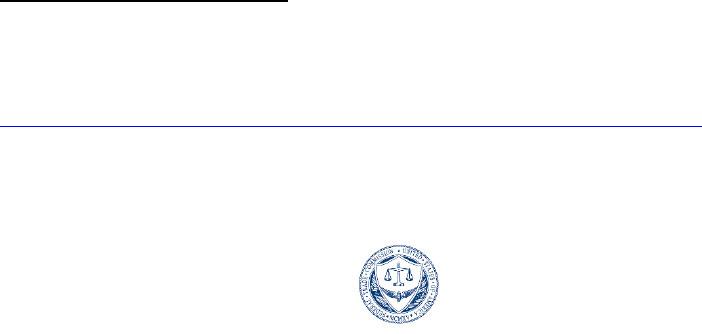
FEDERAL TRADE COMMISSION FTC.GOV 28
• Online shopping fraud remained the most commonly reported category of fraud in which
people of all ages indicated they lost money; however, older adults were much less likely
to report losing money to online shopping fraud than younger adults.
• Romance scams, business impersonation scams, and investment scams caused the highest
aggregate reported losses for older adults as a whole, but prize, sweepstakes and lottery
scams remained the costliest for people 80 and over.
• Aggregated reported losses and the number of reports indicating money was lost by older
adults were highest for online frauds, but reported median individual losses were highest
for frauds that started with a phone call.
• Gift cards and reload cards were the most frequently reported fraud payment methods by
older adults, followed by credit cards. Aggregate losses reported by older adults were
highest on bank transfers or payments.
• New analysis points to differences in how older adults in different demographic
populations may experience fraud.
These findings, explored more fully below, help inform the FTC’s efforts to protect consumers
through consumer education, law enforcement, and policy work.
a. Most Older Adults Who Filed Fraud Reports Avoided Losing Any Money
As in previous years, the overwhelming majority of Sentinel fraud reports filed in 2021
by people 60 or over did not indicate any monetary loss. Figure 1, which controls for population
size,
101
shows that older adults were 68% more likely to file these no-loss reports about fraud
they had spotted or encountered—but avoided losing money on—than people ages 18-59.
102
Moreover, consistent with previous years, older adults were 26% less likely to report losing
money to fraud than people ages 18-59. This suggests that older adults may be more likely to
avoid losing money when exposed to fraud, more inclined to report fraud when no loss has
occurred, or a combination of these or other factors. The FTC’s most recent fraud survey,
published in October 2019, also found that what it called the “rate of victimization” for the
101
The comparison of older adults and younger consumers is normalized against the population size of each age
group. The analysis is based on U.S. Census Bureau data for population by age. See U.S. Census Bureau, Annual
Estimates of the Resident Population for Selected Age Groups by Sex for the United States (June 2020), available at
https://www.census.gov/data/tables/time-series/demo/popest/2010s-national-detail.html
.
102
The largest share of 2021 no-loss reports by older adults were about phone scams, and these were most often
calls from scammers impersonating businesses and government agencies.
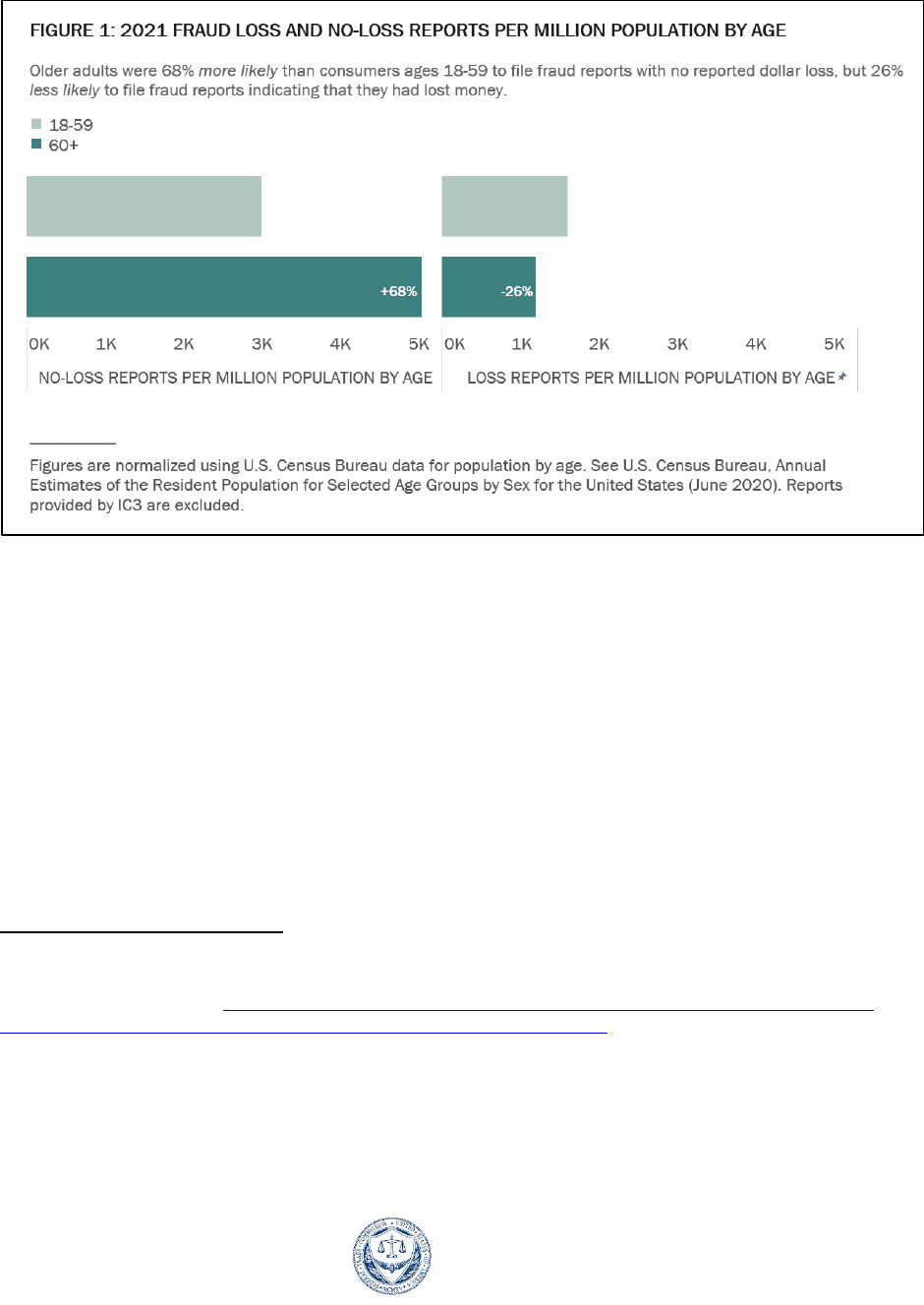
FEDERAL TRADE COMMISSION FTC.GOV 29
various categories of frauds included in the survey was generally lower for those 65 and older
than for younger consumers.
103
b. Older Adults Reported Higher Median Individual Dollar Losses than
Younger Consumers
In 2021, as in previous years, younger consumers were more likely to report losing
money to fraud than older adults, but older adults who did report losing money reported higher
median individual losses (see Figure 2). People 80 and over reported median individual losses of
$1,500, far higher than any other age group. The reported median individual dollar loss increased
for all age groups in 2021 as compared to 2020, but the increases were most striking for younger
adults. These increases can be explained, in part, by a surge in reports of money lost to romance
scams and investment scams, both of which have much higher reported median individual dollar
losses than most other frauds.
104
103
FTC Bureau of Economics Staff Report, Mass-Market Consumer Fraud in the United States: A 2017 Update 76–
79 (Oct. 2019), available at
https://www.ftc.gov/system/files/documents/reports/mass-market-consumer-fraud-
united-states-2017-update/p105502massmarketconsumerfraud2017report.pdf.
104
In 2021, the reported median individual dollar loss by adults 60 and over for reports categorized as romance
scams and investment related fraud was $5,100 and $6,800 respectively, compared to $685 for all fraud reports by
this age group. Here and throughout this report, investment scams refer to fraud reports classified as investment
seminars and advice, stocks and commodity futures trading, art, gems and rare coin investments, and miscellaneous
investments.
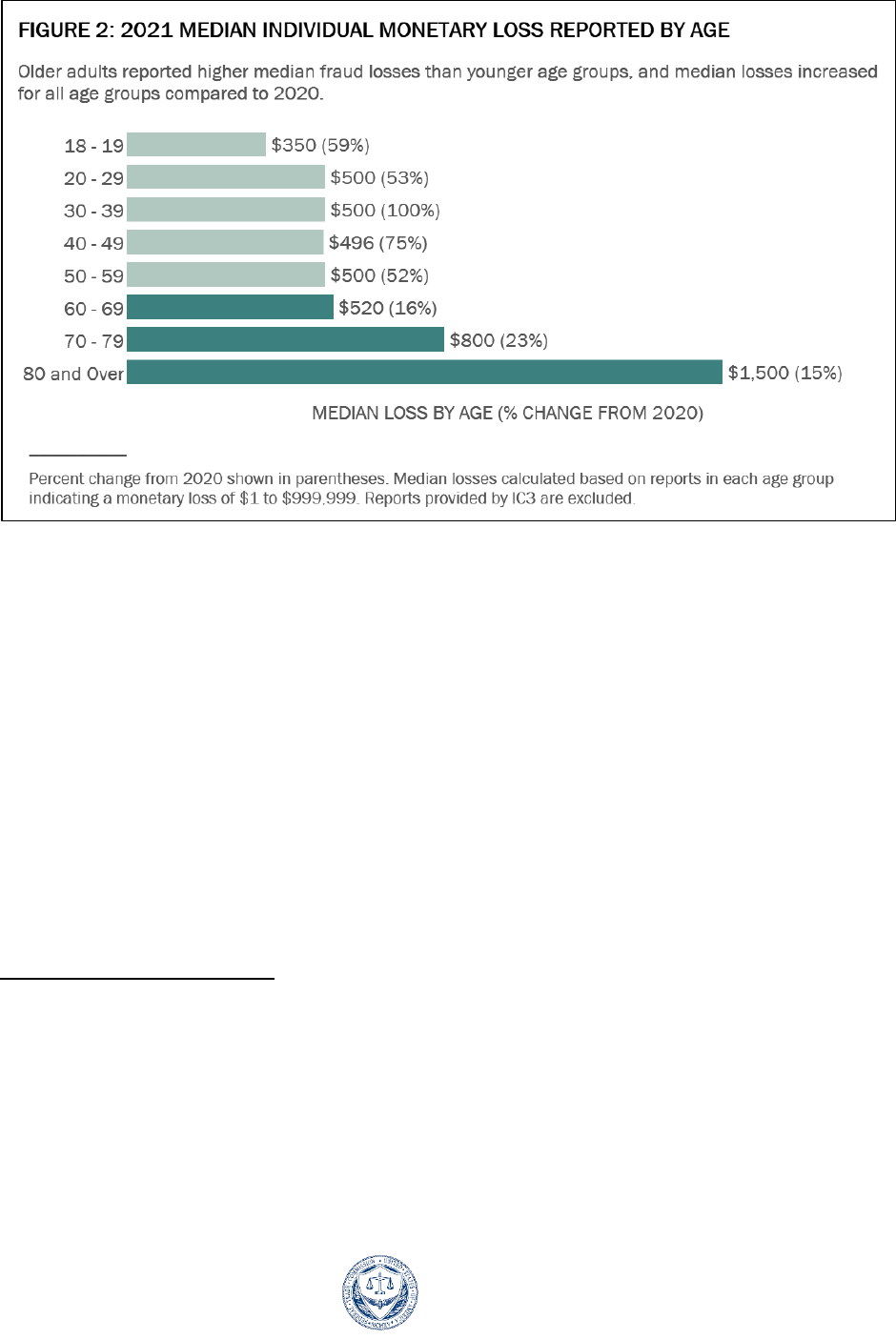
FEDERAL TRADE COMMISSION FTC.GOV 30
Some Sentinel reports are filed on behalf of consumers by adult children, spouses,
caretakers, or others. As in prior years, 2021 Sentinel data show that adults ages 80 and over
were more likely than other age groups to have a Sentinel report filed on their behalf. About 17%
of reports for people 80 and over indicated they were submitted by a person on behalf of the
consumer, a far higher rate than any other age group.
105
Reports submitted by third parties had
higher median individual reported losses as compared to those that were self-reported for all age
groups, but this disparity was particularly striking for older adults.
106
105
The percentage of reports submitted by another person on behalf of a consumer in 2021 were as follows: 17.1%
(80 and over), 5.0% (70-79), 2.9% (60-69), 2.4% (50-59), 2.0% (40-49), 1.8% (30-39), 2.2% (20-29), and 3.8% (18-
19). These figures exclude reports collected by Sentinel data contributors because of differences in identifying
reports submitted by third parties.
106
The 2021 reported median individual dollar losses by age for this subset of reports were as follows: $4,000 (80
and over), $3,000 (70-79), $1,500 (60-69), $1,000 (50-59), $1,000 (40-49), $982 (30-39), $877 (20-29), and $600
(18-19). These figures exclude reports collected by Sentinel data contributors because of differences in identifying
reports submitted by third parties.
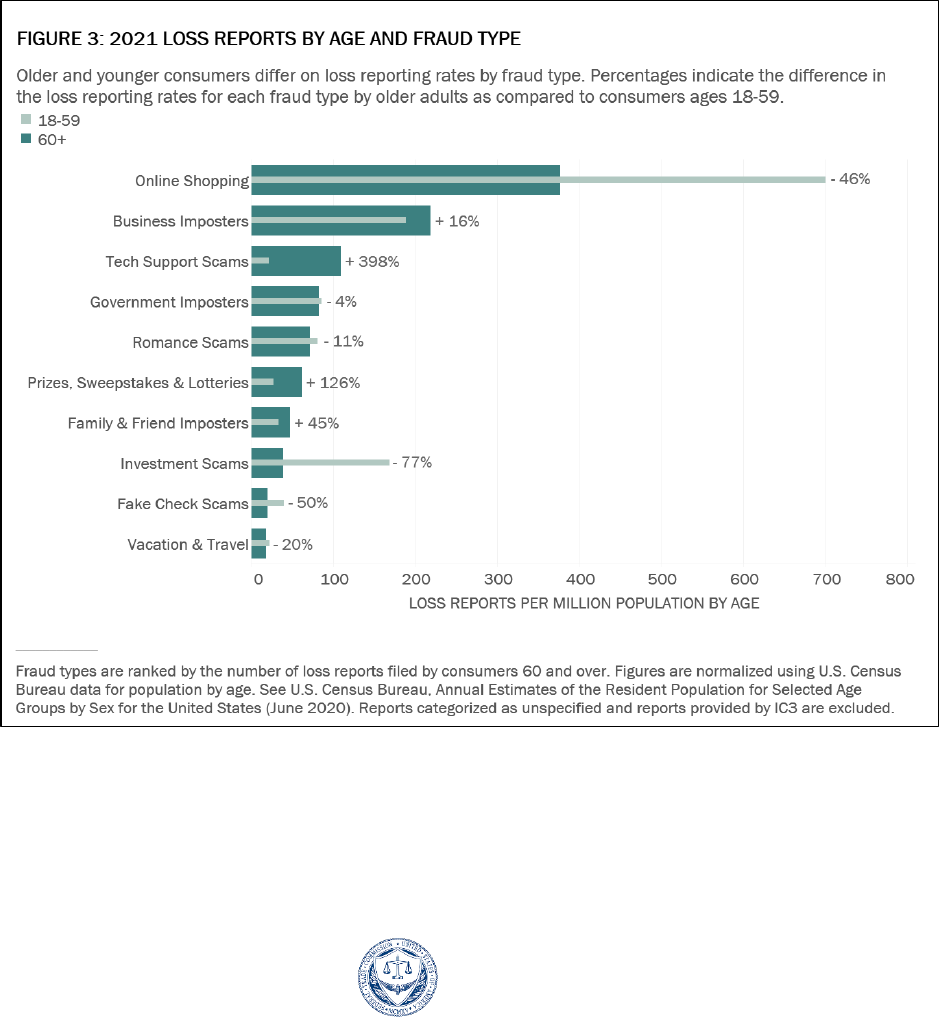
FEDERAL TRADE COMMISSION FTC.GOV 31
c. Some Types of Fraud Affected Older Adults Differently from Younger
Adults
To identify the top scams that had a financial effect on older adults, Figure 3 displays the
top fraud categories ranked by the number of reports by older adults indicating that money was
lost (loss reports). The dark teal bars show loss reports submitted by older adults (age 60 and
over), and the light green lines show loss reports filed by younger people (ages 18-59) for each
category of fraud. As shown in Figure 3, controlling for population size, older adults were more
likely than younger people to report financial losses to certain types of frauds. Three categories
of fraud continued to stand out in 2021. Older adults were: 1) nearly five times, or 398%, more
likely than younger people to report losing money on a tech support scam; 2) more than twice as
likely to report a loss on a prize, sweepstakes or lottery scam; and 3) 45% more likely to report a
loss on a family or friend impersonation scam.

FEDERAL TRADE COMMISSION FTC.GOV 32
Reports of losses to online shopping fraud increased sharply starting in the second
quarter of 2020,
107
and the numbers remained far higher than pre-pandemic levels in 2021 even
as reports of COVID-19 related online shopping fraud declined.
108
Although older adults
continued to be less likely than younger people to report losing money to online shopping fraud,
the number of loss reports submitted by older adults on this fraud type continued to far exceed
any other category of fraud reported by older adults. Ads on social media were frequently
identified as the starting point for these frauds, particularly when the items purchased were
simply not received.
109
Analysis of total dollars reported lost by older adults by fraud type, shown in Figure 4,
highlights the tremendous financial harm caused by romance scams, business impersonation
scams, and investment scams in 2021. The highest aggregate dollar losses reported in 2021 by
older adults were again in the romance scam category. Reported losses to romance scams have
increased significantly in recent years,
110
and this trend accelerated with the start of the COVID-
19 pandemic.
111
For older adults, reported romance scam losses increased from $139 million in
2020 to $213 million in 2021. Among older adults, hardest hit were the 60-69 and 70-79 age
groups, which reported $198 million of the 2021 reported losses. Reported losses by older adults
on business impersonation scams topped $151 million in 2021, more than double the 2020
number. This increase was due, in part, to a surge in reports of losses to scammers posing as
Amazon.
112
The most striking increase was on investment scams, with reported losses by older
adults more than tripling in 2021. This increase was driven in large part by a surge in reports of
losses to cryptocurrency investment scams.
113
Reported losses by older adults to scam
107
See FTC Consumer Protection Data Spotlight, Pandemic purchases lead to record reports of unreceived goods
(July 1, 2020), available at
https://www.ftc.gov/news-events/blogs/data-spotlight/2020/07/pandemic-purchases-
lead-record-reports-unreceived-goods.
108
Adults 60 and over reported 1,567 COVID-19 related online shopping frauds in 2021 compared to 3,190 such
reports in 2020.
109
About one in four older adults who reported losing money on undelivered online shopping purchases in 2021
identified social media as the contact method.
110
See FTC Consumer Protection Data Spotlight, Reports of romance scams hit record highs in 2021 (Feb. 10,
2022), available at
https://www.ftc.gov/news-events/data-visualizations/data-spotlight/2022/02/reports-romance-
scams-hit-record-highs-2021.
111
See FTC Consumer Protection Data Spotlight, Romance scams take record dollars in 2020 (Feb. 10, 2021),
available at
https://www.ftc.gov/news-events/blogs/data-spotlight/2021/02/romance-scams-take-record-dollars-
2020.
112
Amazon imposters reportedly contact consumers with false claims about compromised accounts or unauthorized
purchases. See FTC Consumer Protection Data Spotlight, Amazon tops list of impersonated businesses (Oct. 20,
2021), available at
https://www.ftc.gov/news-events/data-visualizations/data-spotlight/2021/10/amazon-tops-list-
impersonated-businesses.
113
See FTC Consumer Protection Data Spotlight, Reports show scammers cashing in on crypto craze (June 3,
2022), available at
https://www.ftc.gov/news-events/data-visualizations/data-spotlight/2022/06/reports-show-
scammers-cashing-crypto-craze.
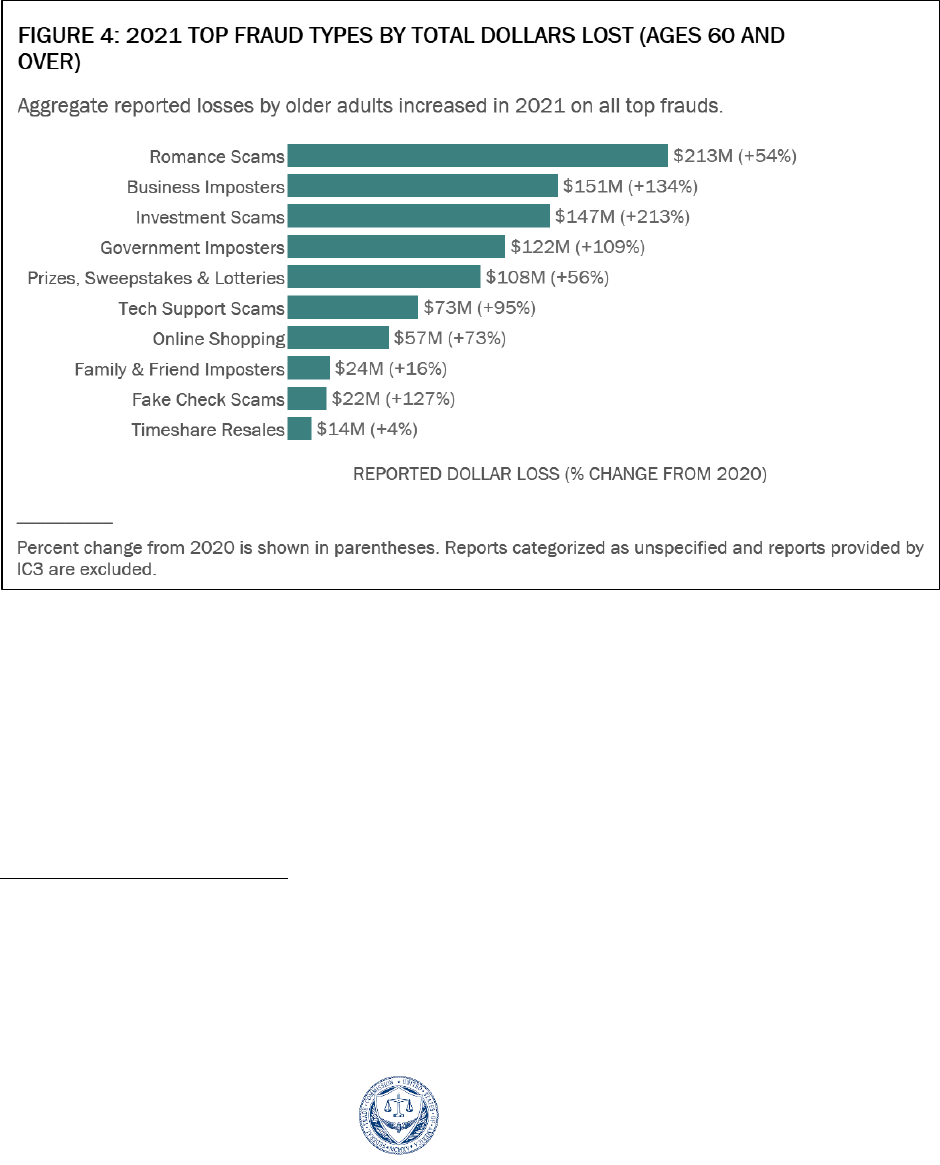
FEDERAL TRADE COMMISSION FTC.GOV 33
investment opportunities where the payment method is in cryptocurrency increased more than
ninefold in 2021.
114
For adults 80 and over the highest aggregate reported losses were again on prize,
sweepstakes and lottery scams, with $47 million reported taken in 2021. This figure represents
an astonishing 31% of all reported fraud losses by people 80 and over in 2021. The median
individual reported loss on these scams for the 80 and over age group was $6,000 in 2021, far
higher than for other age groups.
115
114
Older adults reported $41.5 million lost on fraud categorized as investment related with cryptocurrency as the
payment method in 2021 compared to $4.5 million in 2020.
115
In 2021, the median individual reported loss on prize, sweepstakes and lottery scams was $1,450 for adults 60-79
and $400 for ages 18-59.
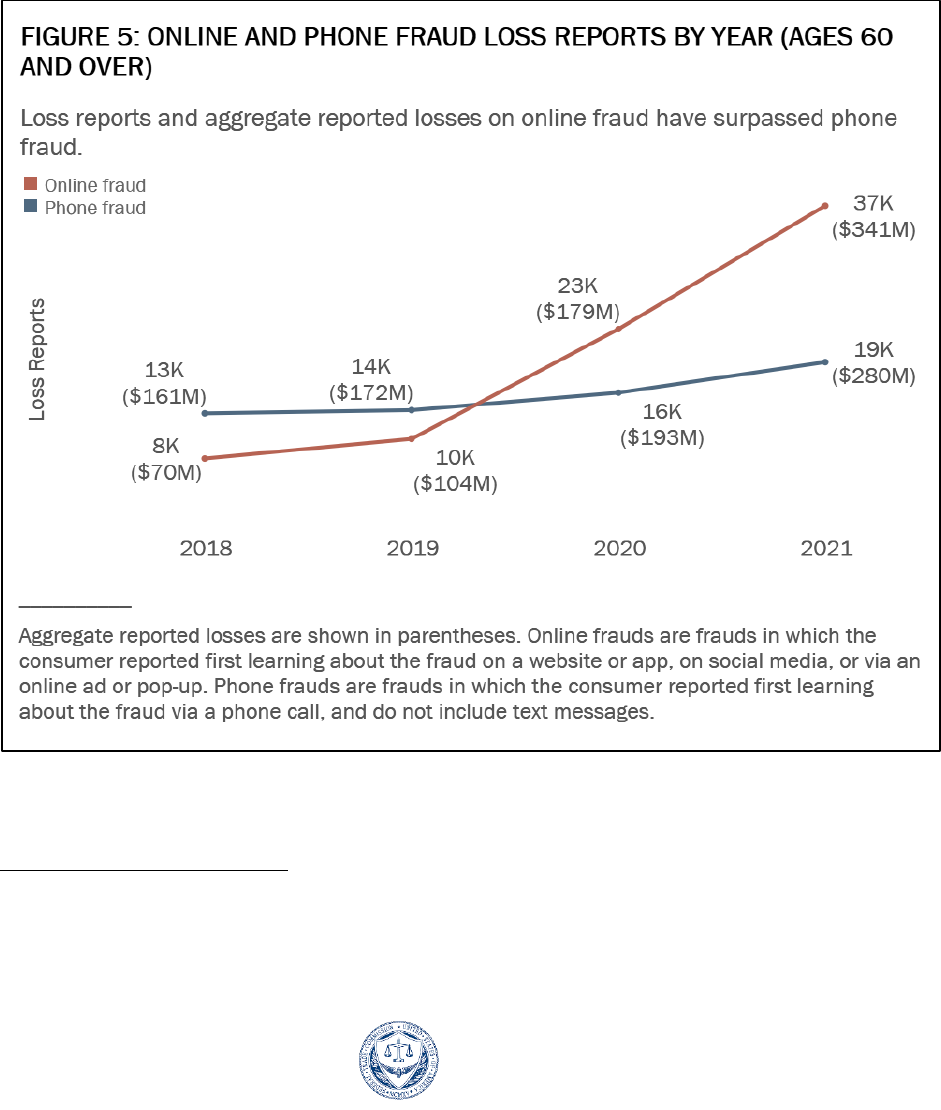
FEDERAL TRADE COMMISSION FTC.GOV 34
d. Older Adults Most Frequently Reported Losses to Online Fraud, But
Reported the Highest Median Individual Loss Amounts to Fraud that
Started with a Phone Call
In 2020, loss reports about online frauds by older adults surpassed phone fraud loss
reports for the first time.
116
This trend accelerated in 2021, with online fraud loss reports by older
adults increasing by more than 60% to nearly double the phone fraud number (see Figure 5).
Aggregate reported losses to online fraud by older adults increased 90%, surpassing phone fraud
for the first time in 2021. However, 2021 reported median individual losses remained far higher
for phone fraud at $1,500 compared to $300 for online fraud.
116
Online frauds are defined here as those in which the consumer reported first learning about the fraud on a website
or app, on social media, or via an online ad or pop-up. Phone frauds are those in which the consumer reported first
learning about the fraud via a phone call. Text frauds belong to a category separate from phone frauds.
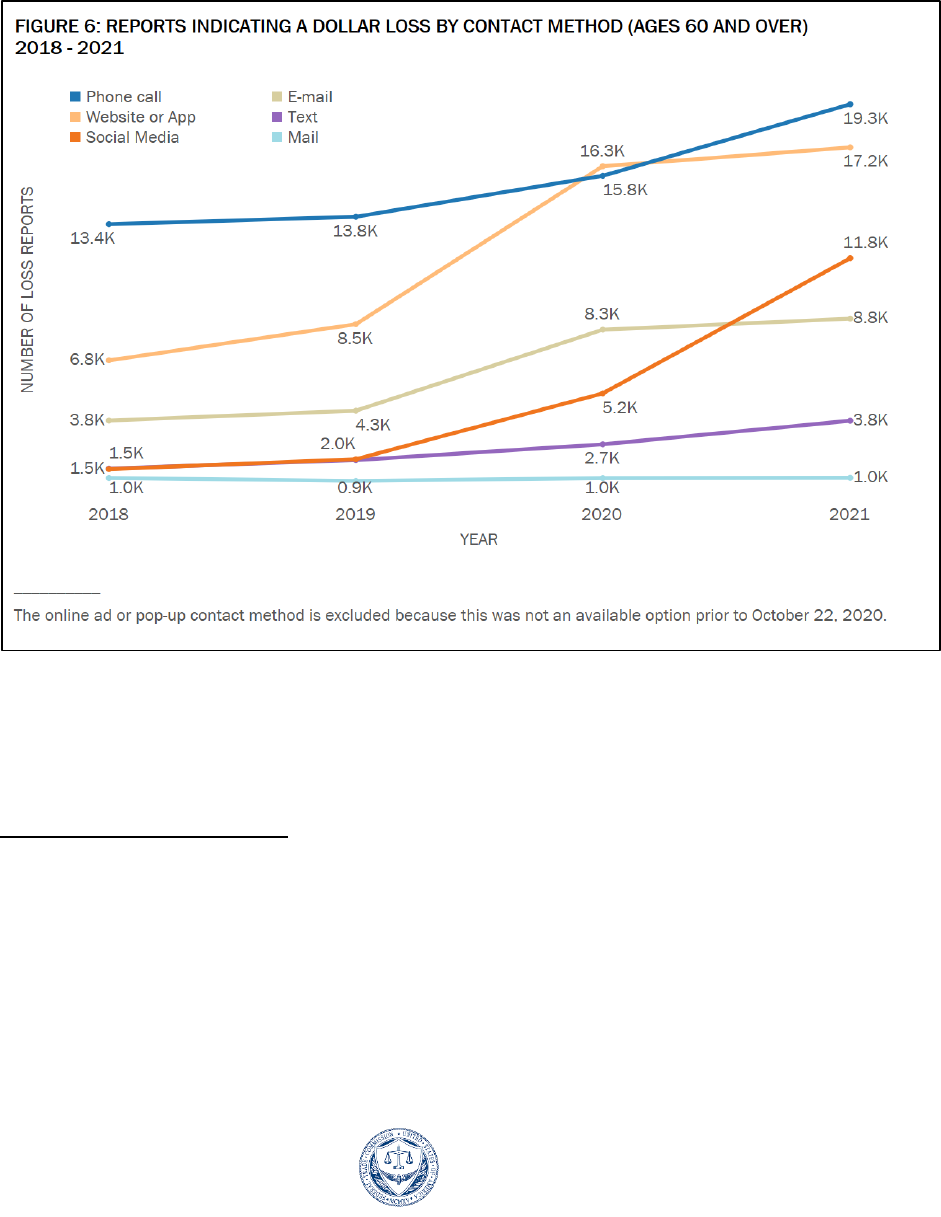
FEDERAL TRADE COMMISSION FTC.GOV 35
People 80 and over were again an exception in that this age group continued to report
losses to phone fraud at higher rates than online fraud,
117
and their aggregate reported losses to
phone fraud were more than twice that of online fraud.
118
About 46% of aggregate reported
losses by this age group were on phone fraud compared to 24% of aggregate reported losses by
people ages 60-79. Moreover, the median individual reported loss to phone fraud was $3,000 for
people 80 and over compared to $1,340 for people ages 69-79.
Figure 6 shows the yearly trend in loss reports for each of the contact methods collected
in Sentinel.
119
Reports indicating a loss to fraud that reached older adults via social media once
117
In 2021, 38% of reports indicating a dollar loss by adults 80 and over were about phone fraud and 27% were
about online fraud. By comparison, 20% of reports indicating a dollar loss by adults 60-79 were about phone fraud
and 43% were about online fraud.
118
The aggregate reported loss on phone fraud by adults 80 and over in 2021 was $70 million, compared to $26
million on online fraud.
119
Figure 6 excludes the online ad or pop-up contact method because this was not an available option prior to
October 22, 2020.
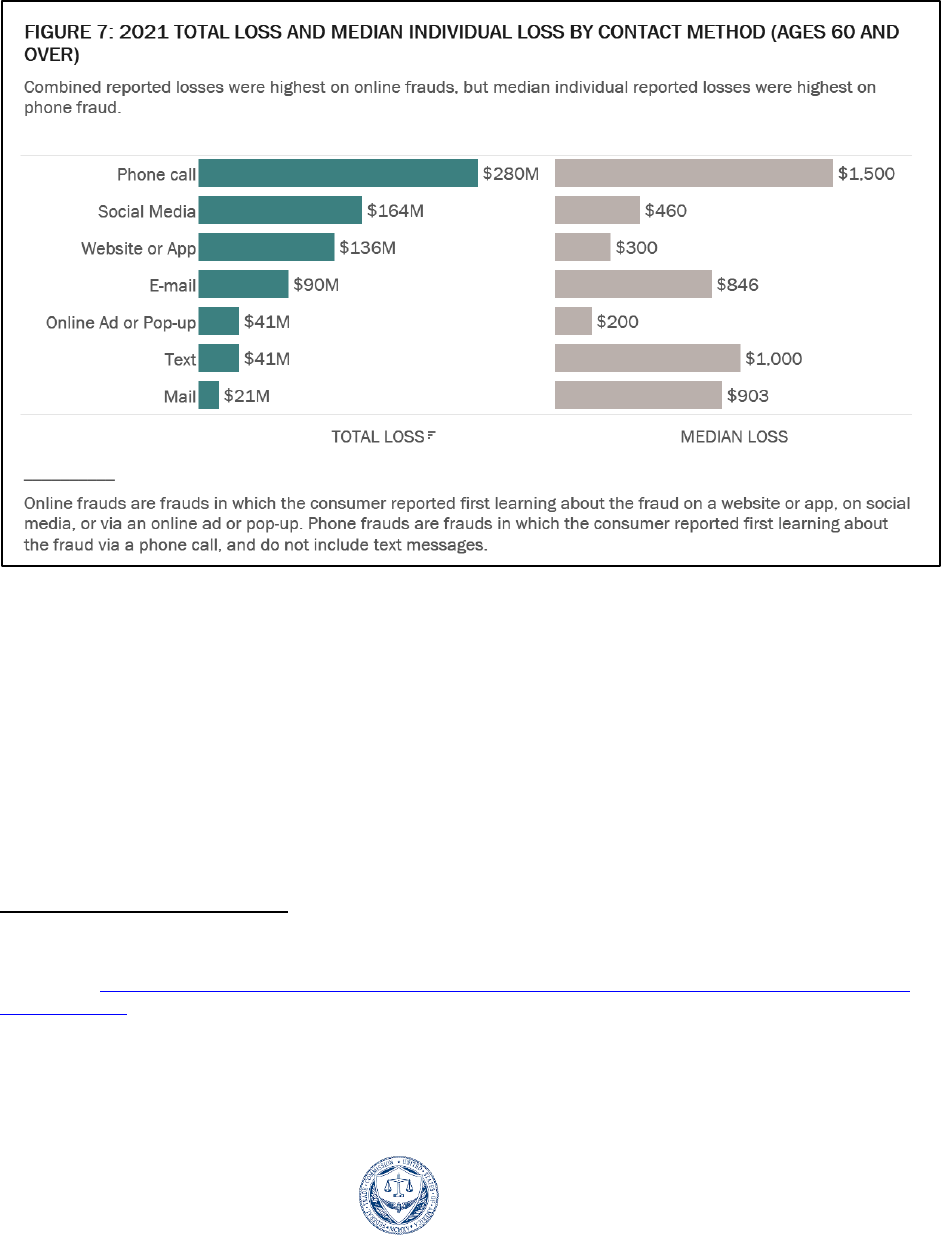
FEDERAL TRADE COMMISSION FTC.GOV 36
again more than doubled.
120
A 40% increase in reports of losses to text scams was also notable,
although the numbers relative to other contact methods remained low. The data suggest that
attempted phone fraud continued to be a concern for older adults. More than a third of fraud
reports by adults 60 and over in 2021 were about phone contacts with no reported dollar loss,
compared to just 17% of reports by younger adults.
121
Figure 7 shows 2021 aggregate reported losses and median individual reported losses for
each of the contact methods collected in Sentinel. The social media contact method again stands
out, with total reported losses more than doubling from $63 million in 2020 to $164 million in
2021. Median individual reported losses on social media scams by older adults increased from
$204 in 2020 to $460 in 2021. Also notable were text scams, which showed higher median
individual reported losses than any other contact method with the exception of phone calls. The
total loss amount reported by older adults on text scams increased from $22 million in 2020 to
$41 million in 2021.
The types of frauds older adults most frequently reported losing money to varied by
contact method. As in 2020, when the contact method was a phone call, older adults most often
120
See FTC Consumer Protection Data Spotlight, Social media a gold mine for scammers in 2021 (Jan. 25, 2022),
available at
https://www.ftc.gov/news-events/data-visualizations/data-spotlight/2022/01/social-media-gold-mine-
scammers-2021.
121
Older adults submitted 406,955 reports indicating a contact method in 2021, while younger adults submitted
752,022 reports indicating a contact method. Of these, 148,204 reports by older adults indicated a phone call was the
contact method and no money was lost, compared to 131,153 such reports by younger adults.

FEDERAL TRADE COMMISSION FTC.GOV 37
reported dollar losses on business impersonation scams followed by government impersonation
scams and tech support scams. However, for the 80 and over age group, loss reports indicating a
phone call as the method of contact were again most often about prize, sweepstakes and lottery
scams. When text was the contact method, the largest share of loss reports by older adults were
business impersonation scams, particularly those impersonating Amazon. When the contact
method was online, most of the loss reports by older adults were about online shopping frauds,
with business impersonation scams and romance scams a distant second and third.
122
While
online shopping was the most commonly reported fraud, the amount of losses were highest for
romance and then investment scams. About 60% of all dollars reported lost to online fraud by
older adults were lost to romance scams and investment scams.
123
e. Gift Cards Were the Most Frequently Reported Payment Method, but Bank
Transfers Took the Top Spot for Total Dollars Lost
People reporting fraud frequently indicate the payment method they used, and this
information helps the FTC identify opportunities for enforcement and consumer education. The
first column in Figure 8 shows that, in 2021, older adults most often reported paying scammers
with gift cards or reload cards followed by credit cards and debit cards. The second column in
Figure 8 shows the aggregate dollar losses that older adults reported for the payment methods
shown. Aggregate losses reported by older adults were highest on bank transfers and payments.
122
Of 37,178 online fraud reports by older adults indicating a dollar loss in 2021, 20,130 were about online
shopping fraud, followed by 3,863 business impersonation scam reports and 3,269 romance scam reports.
123
Of $341 million dollars reported lost to online fraud by older adults in 2021, $137 million was reported lost to
romance scams and $72 million was reported lost to investment scams.
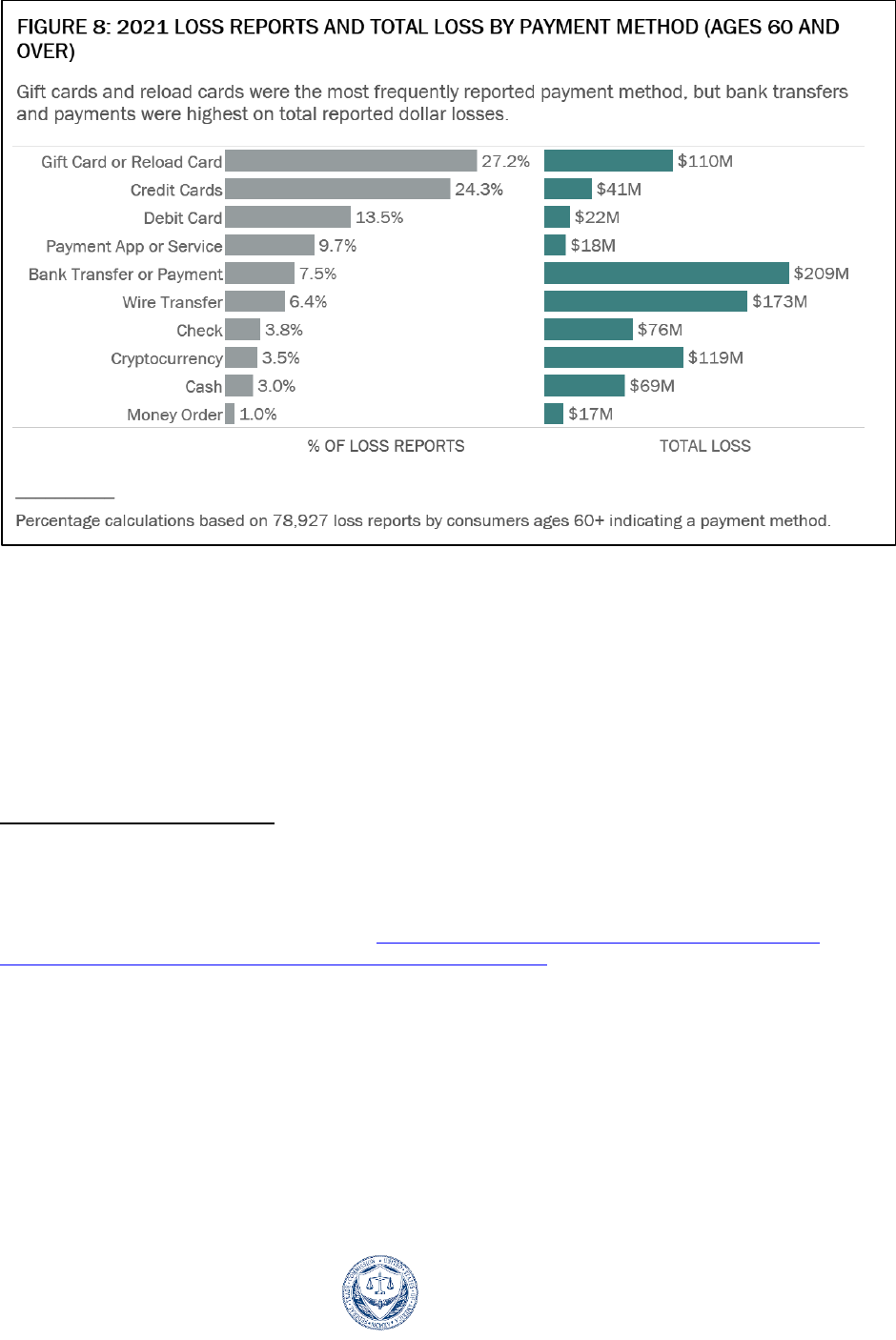
FEDERAL TRADE COMMISSION FTC.GOV 38
Several notable shifts occurred in the payment methods reported by older adults in 2021
as compared to 2020. The number of older adults who said they paid with a gift card or reload
card increased by about 67%.
124
These reports were largely about impersonation scams, with the
growth related to a sharp increase in reports of scammers posing as well-known businesses.
125
Reported losses by older adults using bank transfers and payments more than doubled,
126
with
the largest share of these losses going to romance scams, investment related fraud, and business
impersonation scams.
127
Most striking was the more than fivefold increase in reported losses
124
In 2021, 21,436 fraud loss reports by older adults indicated gift card or reload card as the method of payment
compared to 12,813 in 2020. Reported losses by older adults using this payment method increased from $59 million
in 2020 to $110 million in 2021. See FTC Consumer Protection Data Spotlight, Scammers prefer gift cards, but not
just any card will do (Dec. 8, 2021), available at
https://www.ftc.gov/news-events/data-visualizations/data-
spotlight/2021/12/scammers-prefer-gift-cards-not-just-any-card-will-do.
125
In 2021, about 66% of reports by older adults indicating gift card or reload card as the payment method were
categorized as imposter scams. Reports by older adults classified as business imposter scams with gift card or reload
card as the payment method increased 83% in 2021 as compared to 2020.
126
Adults 60 and over reported $209 million (5,904 loss reports) lost to fraud with bank transfers and payments as
the payment method in 2021 compared to $99 million (2,948 loss reports) in 2020.
127
In 2021, adults 60 and over reported losing $43 million to romance scams using bank transfers and payments as
the payment method, followed by investment related fraud at $39 million and business imposter scams at $37
million.

FEDERAL TRADE COMMISSION FTC.GOV 39
using cryptocurrency as the payment method.
128
The largest share of reported cryptocurrency
losses by older adults were on investment scams, with romance scams a close second.
129
f. Identifying Differences in Fraud and Consumer Issues Affecting Older
Adults of Color
FTC research and analysis has demonstrated that different demographic communities
report different types of fraud at different rates.
130
This section seeks to identify trends for older
adults in Black, Latino, and Asian American and Pacific Islander (“AAPI”) populations.
Although the FTC does not collect race and ethnicity information directly from consumers, a
method to impute race and ethnicity using name and zip code information has been applied for
the purpose of identifying any trends in reporting.
131
Using this method, over 138,000 fraud
reports filed from 2019 to 2021 from older adults most likely to be Black, Latino, and AAPI
were identified for analysis.
132
The results show differences in the reported fraud types and
128
Adults 60 and over reported $119 million (2,796 loss reports) lost to fraud with cryptocurrency as the payment
method in 2021 compared to $22 million (784 loss reports) in 2020.
129
In 2021, adults 60 and over reported losing $42 million to investment scams using cryptocurrency as the payment
method, followed by romance scams at $40 million.
130
FTC Staff Report, Serving Communities of Color, at 41-46 (Oct. 2021), available at
https://www.ftc.gov/system/files/documents/reports/serving-communities-color-staff-report-federal-trade-
commissions-efforts-address-fraud-consumer/ftc-communities-color-report_oct_2021-508-v2.pdf.
131
The procedure used to impute race and ethnicity for this report combines information from a consumer’s first
name, surname, and home zip code, with a method known as Bayesian Improved First Name Surname Geocoding
(BIFSG). Where BIFSG could not be applied, race/ethnicity probabilities were determined using surname and zip
code (BISG) and using zip code alone where surname could not be used. Consumers were then classified according
to their largest single race/ethnicity probability, an approach called max a posteriori (MAP) classification. To check
for robustness, statistics were also computed using race probabilities as weights and threshold classification methods
to ensure that the findings broadly held across methodologies. BISG is a standard technique in fair lending analysis
for banking supervision, originally explored in Mark N. Elliott et al, Using the Census Bureau’s surname list to
improve estimates of race/ethnicity and associated disparities, Health Services and Outcomes Research
Methodology 9, no. 2. (2009). For more information on BIFSG, See Ioan Voicu, Using First Name Information to
Improve Race and Ethnicity Classification, Statistics and Public Policy, Volume 5, Issue 1 (2018) at 1-13. available
at https://www.tandfonline.com/doi/full/10.1080/2330443X.2018.1427012
.
132
Three years of reporting data were used to increase the sample size. The number of 2019-2021 reports identified
for analysis for each group were as follows: 72,235 Black, 50,435 Latino, and 15,453 AAPI. Note that this
information only includes a fraction of the older adults in these populations who experienced fraud. One study has
shown that only about 4.8 percent of the victims of mass-marketing consumer fraud complained to the Better
Business Bureau or a government agency. See Keith Anderson, To Whom Do Victims of Mass-Market Consumer
Fraud Complain? at 1 (May 2021), available at https://papers.ssrn.com/sol3/papers.cfm?abstract_id=3852323
(study showed that only 4.8 percent of victims of mass-market consumer fraud complained to a Better Business
Bureau or a government entity). Further, research involving nine consumer protection matters found that heavily
Black and Latino areas complained substantially less relative to their rate of victimization after controlling for other
demographic characteristics. See Devesh Raval, Whose Voice Do We Hear in the Marketplace? Evidence from
Consumer Complaining Behavior, Marketing Science (2020), 39 (1), 168-187, available at
https://deveshraval.github.io/complaintBehavior.pdf.
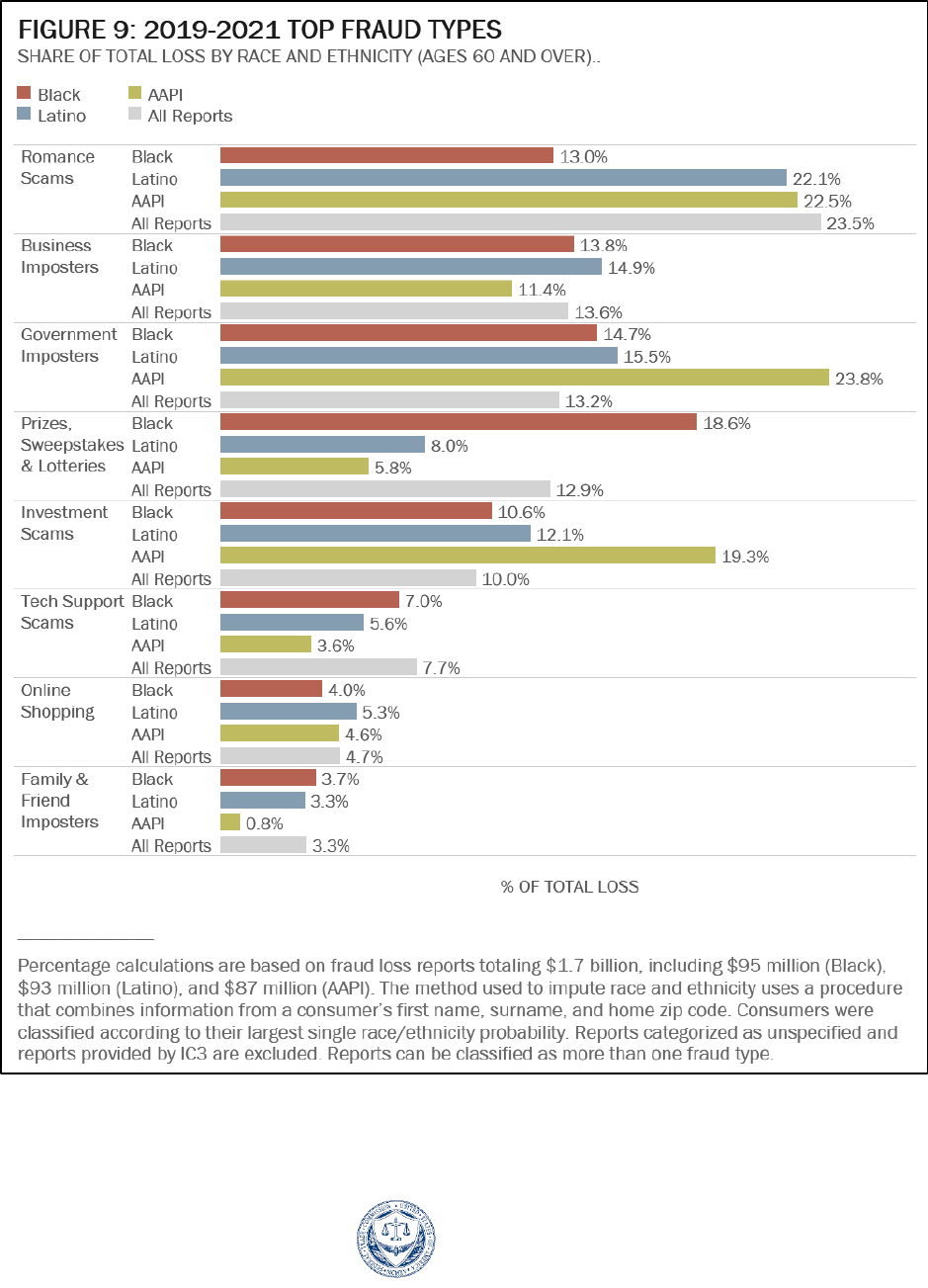
FEDERAL TRADE COMMISSION FTC.GOV 40
payment methods for each community, as well as larger reported median dollar losses for older
adults most likely to be AAPI.

FEDERAL TRADE COMMISSION FTC.GOV 41
Figure 9 shows top fraud types by the share of total reported losses by older adults most
likely to be Black, Latino, and AAPI. The gray bar represents all reports by older adults.
133
Each
colored bar shows the share of total losses from each demographic group about various types of
fraud. The data suggest that the fraud types with the highest reported dollar losses for older
adults as a whole are also among the most costly for Black, Latino and AAPI older adults.
However, differences are also evident. For example, 24% of total reported losses by older adults
most likely to be AAPI were on government impersonation scams, compared to just 13% of all
reports.
134
Older adults most likely to be AAPI also had a much higher share of reported losses
on investment-related fraud. These reports have continued to climb, and in the first six months of
2022, 57% of all reported losses by the AAPI group were on investment scams, and nearly half
of these losses were in cryptocurrency. For reports from older adults most likely to be Black,
prize, sweepstakes and lottery scams stand out at 19% of the total reported losses for this group
compared to 13% for older adults generally. The largest share of these losses was on phone
scams in which consumers reported that the scammers claimed a connection with
well-known businesses.
133
Because the method used to impute race requires a U.S. zip code of residence, reports from consumers residing
outside the U.S. have been excluded here and throughout this section of the report.
134
Reports about scammers impersonating immigration and customs officers contributed to the higher share of
reported losses on government imposter scams among older adults most likely to be AAPI. See Consumer Alert,
FTC, Scammers impersonate U.S. immigration officers, available at
https://consumer.ftc.gov/consumer-
alerts/2022/07/scammers-impersonate-us-immigration-officers. This group also reported scams impersonating the
Chinese Consulate. See Consumer Alert, FTC, Scammers impersonate the Chinese Consulate (April 18, 2018),
available at
https://consumer.ftc.gov/consumer-alerts/2018/04/scammers-impersonate-chinese-consulate.
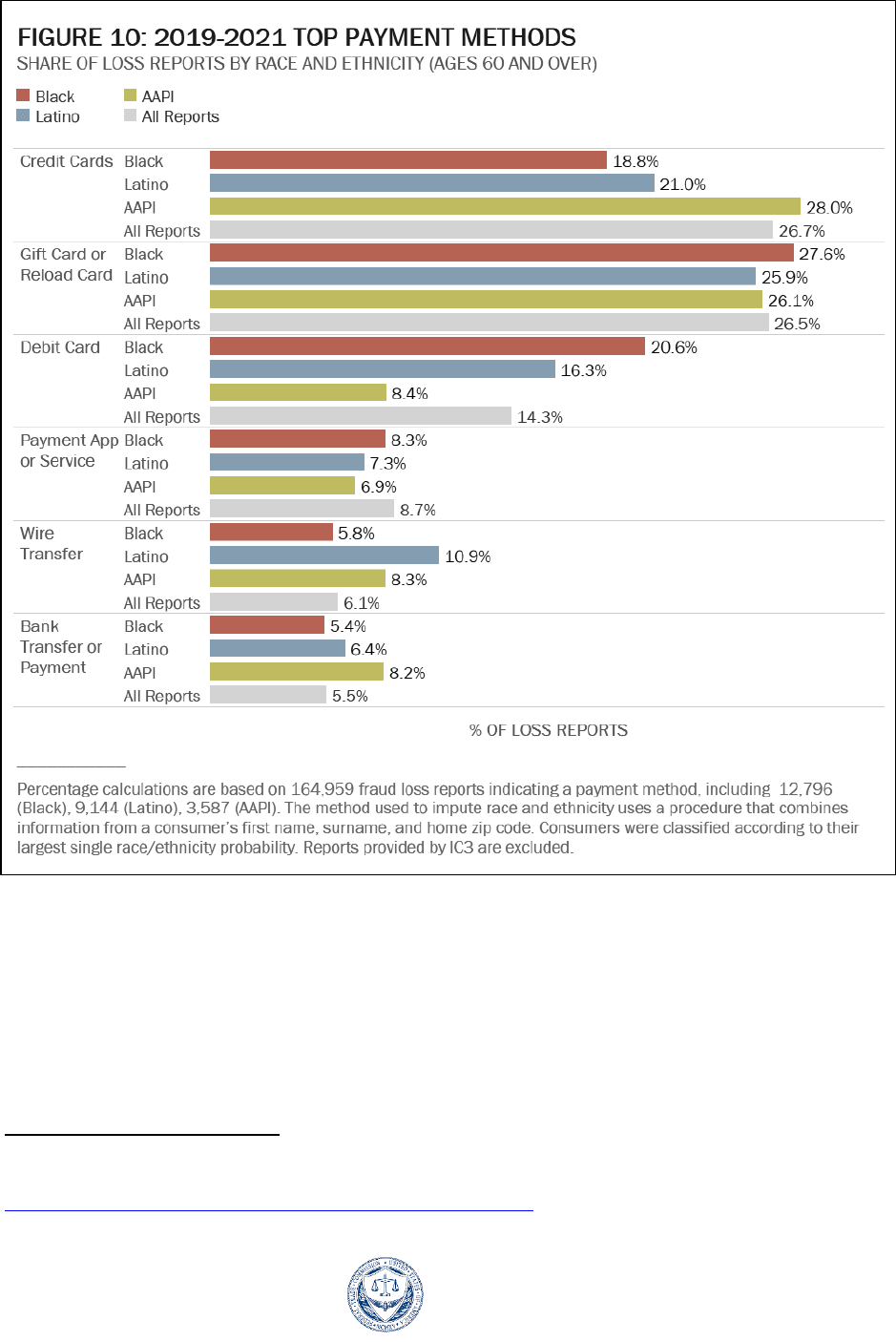
FEDERAL TRADE COMMISSION FTC.GOV 42
Figure 10 shows the differences in the top fraud payment methods reported by older
adults for each of the three demographic groups. Older adults most likely to be Black and Latino
filed a larger share of their reports about payments made with debit cards compared to all older
adults, and a lower share about payments made with credit cards. Because the law provides
additional fraud protection in credit card transactions, these disparities are especially noteworthy
for consumer reports of fraud.
135
Figure 10 also shows that older adults most likely to be Latino
reported using wire transfers as the payment method in 11% of their reports compared to just 6%
135
See FTC Consumer Advice, Lost or Stolen Credit, ATM, and Debit Cards, available at
https://consumer.ftc.gov/articles/lost-or-stolen-credit-atm-debit-cards
.

FEDERAL TRADE COMMISSION FTC.GOV 43
for all older adults. About 22% of these reports were about scammers impersonating friends and
family members, compared to 8% of all wire transfer reports by older adults.
Fraud reports from older adults in each demographic group also showed differences in
individual loss amounts and the share of reports that indicated any money was lost. The median
reported loss from 2019 to 2021 was $600 for the older adults most likely to be Black, $720 for
older adults most likely to be Latino, and $1,000 for older adults most likely to be AAPI,
compared to $650 for all older adults. These differences were seen across many different fraud
types, with the older adults most likely to be AAPI reporting higher median losses than those
most likely to be Black and Latino as well as all older adults on most frequently reported
frauds.
136
As with older adults generally, most fraud reports from the three demographic groups
were no-loss reports. However, for all three groups the share of fraud reports that did indicate a
monetary loss was higher than for all older adults.
137
2. Analysis of Social Security Administration Scam Reports
Government impersonators have been plaguing U.S. consumers for many years now. In
2021, the FTC received almost 400,000 reports about government impersonators.
138
Scammers
impersonating the Social Security Administration (“SSA”) topped the list in 2021 with more than
217,000 reports and almost $150 million dollars in reported losses.
136
Of the top fraud types identified in Figure 9, the AAPI group reported higher median individual losses than all
older adults on all but the family and friend imposters fraud type. Compared to the Black and Latino groups, the
AAPI group reported higher median individual losses for all but the online shopping and family and friend imposters
fraud type.
137
From 2019-2021, the share of fraud reports indicating a monetary loss was 17% for all older adults, 20% for both
the Black and Latino groups, and 26% for the AAPI group.
138
Explore Government Imposter Scams, FTC Tableau Public Infographic, available at
https://public.tableau.com/app/profile/federal.trade.commission/viz/GovernmentImposter/Infographic
.
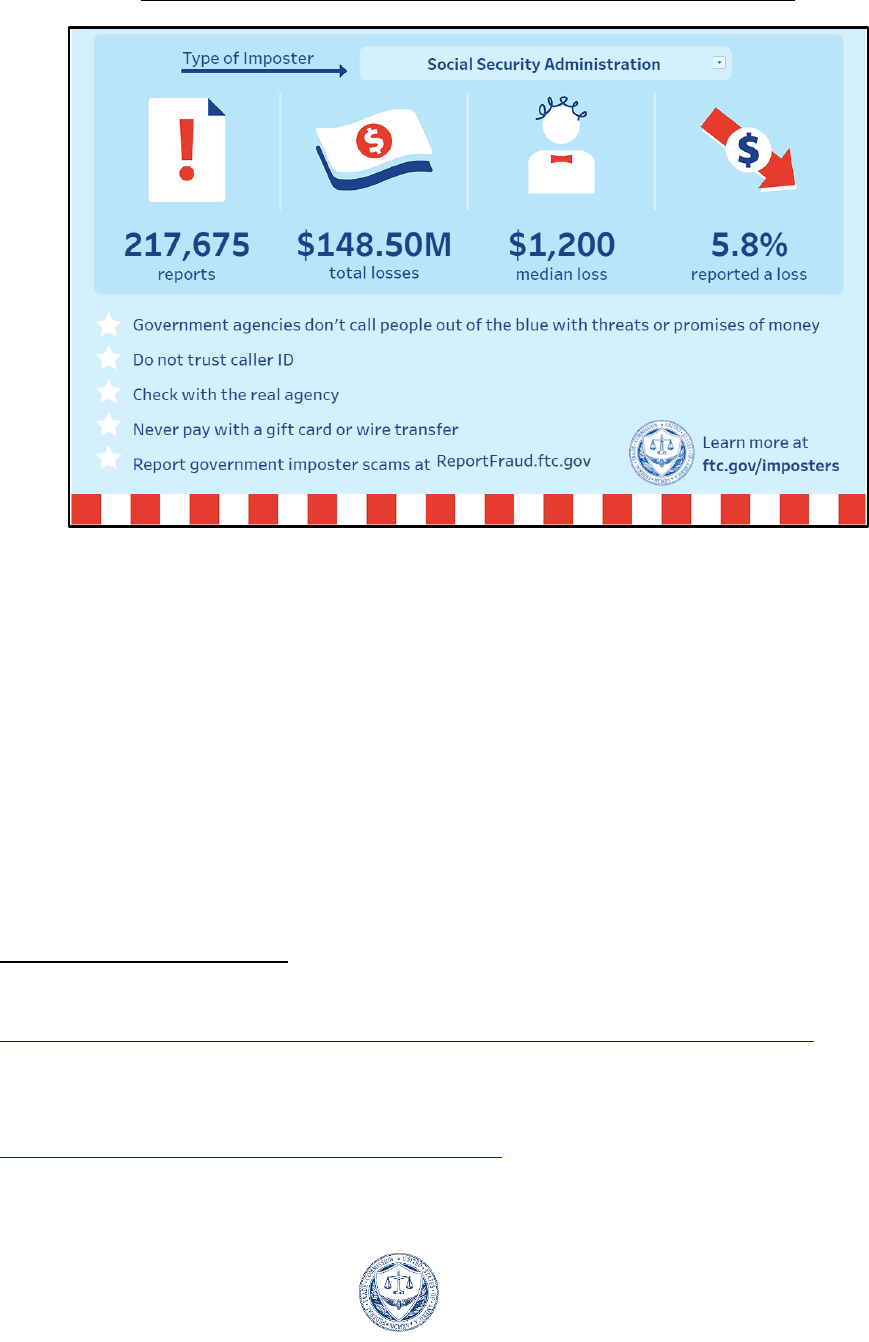
FEDERAL TRADE COMMISSION FTC.GOV 44
2021 Data from FTC’s Explore
Government Imposters Dashboard
139
The SSA Scam typically starts with an automated phone call from scammer claiming
there is a problem with the consumer’s Social Security number, often claiming it has been
suspended because of criminal activity. The scammer tells consumers to avoid arrest and secure
their money, they must purchase gift cards or cryptocurrency, or wire money. The scammer then
takes the consumer’s funds.
Two researchers took a closer look at the reports received by the FTC about the SSA
Scam, using a variety of methods to learn more about the scam.
140
Among other things, the
researchers confirmed that SSA scam reports followed some of the trends for all government
impersonator scams, that is, that older adults file fewer reports about losing money to these
scams than younger people, but older adults lose significantly more money per incident
on average.
141
139
FTC, Explore Government Imposter Scams (last updated July 20, 2022), available at
https://public.tableau.com/app/profile/federal.trade.commission/viz/GovernmentImposter/Infographic
.
140
DeLiema, Marguerite, and Paul Witt. Mixed Methods Analysis of Consumer Fraud Reports of the Social Security
Administration Impostor Scam. Ann Arbor, MI. University of Michigan Retirement and Disability Research Center
(MRDRC) Working Paper; MRDRC WP 2021-434 (2021) available at
https://mrdrc.isr.umich.edu/publications/papers/pdf/wp434.pdf
.
141
Id. at 35, 40, 45, 46.

FEDERAL TRADE COMMISSION FTC.GOV 45
In looking at the narratives in the consumer reports, the researchers found evidence of
high intensity emotional arousal in nearly every consumer narrative.
142
The researchers noted
that “[o]f the 600 cases in the sample, 312 included threats of arrest, 220 mentioned drug-related
charges, and 165 mentioned money laundering charges.”
143
They further found that
“[c]onsumers who complied with the scam described how these threats instilled fear, anxiety,
and panic.”
144
The most common emotion word in the consumers’ narratives was “scared,” along
with derivatives such as “afraid,” “worried,” “terrified,” “paralyzed,” “panicked,” “shaking,”
“nervous,” “fearful,” and others.
145
The researchers also matched the zip code information for all consumer reports to U.S.
Census Bureau information and looked to the demographic information for those zip code areas.
They found that consumers from majority Black, Asian, and Hispanic communities are more
likely to report that they lost money than people in non-Hispanic White communities.
146
People
from non-Hispanic White communities reported higher average losses.
147
Researchers also noted
that reports about the SSA scam often mentioned successful interventions by third parties in the
narrative, such as: “(1) retail store employees, including cashiers, store managers, and bank
tellers; (2) law enforcement officers; (3) friends and family members; (4) SSA employees; and
(5) financial institutions.”
148
3. Hearing Directly from Older Adults About FTC Impersonators
The FTC continued its program this year to engage with and gather information from
older adults who reported losing money to scammers pretending to work at or be affiliated with
the FTC. FTC staff reached out to the majority of people who filed these reports to explain that
the FTC does not distribute prizes, money, or grants, and provided additional information as
needed. During these calls, staff learned more about the means by which scammers continued to
call older adults and ultimately steal their money.
Information from this program indicates that as the isolation of the pandemic continues,
scammers continue to call older adults and use the FTC’s name to gain their trust. At the outset,
when the scammer states that they are part of a government agency, they gain an aura of
142
Id. at 43.
143
Id. at 21-22.
144
Id.
145
Id.
146
Id. at 47-48.
147
Id. at 36, 47-48.
148
Id. at 23.

FEDERAL TRADE COMMISSION FTC.GOV 46
legitimacy, which seems to increase the likelihood that consumers will respond. Once this aura is
established, they move on to finding ways to convince people to send them money.
The most common approach scammers employ is to talk about prizes the consumer
supposedly won, such as cash, cars, or overseas vacations. The required payments are presented
as taxes, import and customs fees, and delivery charges that must be paid before the prize can be
delivered. Individually these payments are seldom large, but over time as the scam is
perpetuated, they can accumulate into an enormous loss. To lower consumers’ suspicions and
keep the money coming in, the scammers develop “relationships” with the consumers, calling
several times a week to check up on them and to give updates on their prize. Sometimes a
consumer is passed on to another caller working the scam, which helps convince them that each
payment brings their jackpot closer. Secrecy is also emphasized, supposedly to make the huge
payout a surprise to the consumer’s family when it comes. But in reality, secrecy prevents other
family members or friends from learning how much the consumer has paid.
Many of the older adults contacting the FTC have grown suspicious and want to confirm
that the callers they have been interacting with are indeed FTC employees. Yet, FTC staff may
also spend significant time convincing the consumer that the scammers are not in any way
employed by or affiliated with the FTC. In other instances, some of the older adults already have
consulted with family members about what has been happening and contact the FTC in order to
report the scam. In such circumstances, they are contacting the FTC to ensure that others are not
similarly deceived and will not suffer difficult and often devasting monetary losses.
B. Coordinated Efforts to Protect Older Consumers
The FTC’s Every Community Initiative leads the agency’s strategic planning for the
protection of older consumers. As highlighted in last year’s Serving Communities of Color
Report, different types of consumer protection issues affect different groups of people, and this
Initiative examines the impact of various schemes on distinct groups, including older adults,
military service members and veterans, Black Americans, Latinos, Asian Americans, Native
Americans, communities who speak languages other than English, and other groups.
149
The
Initiative uses research and input from stakeholders in communities to develop strategies to
prevent fraud, inform the agency’s law enforcement program, and expand outreach. These
partnerships across the country have been extremely valuable as the FTC identifies potential
cases and further develops strategies to protect older adults in a wide range of communities from
financial loss.
In pursuing law enforcement actions to have the largest possible impact, the FTC also
coordinates with federal, state, local, and international agencies, including those with criminal
authority, leveraging resources to track down fraudsters and build cases to stop them. In
149
FTC Staff Report, Serving Communities of Color: A Staff Report on the Federal Trade Commission’s Efforts to
Address Fraud and Consumer Issues Affecting Communities of Color (Oct. 2021), available at
https://www.ftc.gov/system/files/documents/reports/serving-communities-color-staff-report-federal-trade-
commissions-efforts-address-fraud-consumer/ftc-communities-color-report_oct_2021-508-v2.pdf.

FEDERAL TRADE COMMISSION FTC.GOV 47
particular, the FTC participates in the Global Anti-fraud Enforcement Network, a multilateral
network of agencies that enforces laws prohibiting mass marketing fraud. The Network has been
pivotal in enforcement actions against entities that have defrauded millions of older consumers.
Further, the FTC has continued to be an active member of the Elder Justice Coordinating
Council, a multi-agency federal entity that coordinates activities across the federal government
related to elder abuse, neglect, and exploitation. Led by the Assistant Secretary for Aging within
the Department of Health and Human Services (“HHS”), the EJCC meets at least twice a year
with the goal of better coordinating the federal response to elder abuse.
150
At the December 2021
meeting, the FTC’s Elder Justice Coordinator presented information about the FTC’s efforts to
protect older adults from fraud and bad business practices, highlighting the FTC’s work to better
serve people living in communities of color.
151
At the June 2022 meeting, six researchers
summarized their recent projects, including Dr. Marti DeLiema who discussed her paper
analyzing consumer reports received in the FTC’s Consumer Sentinel Network about the SSA
impersonation scam.
152
The EJCC and its staff-level working group have strengthened the FTC’s
connections with other federal government offices that are also working to combat elder abuse
and has facilitated valuable information sharing and coordination.
Finally, pursuant to the Stop Senior Scams Act,
153
the FTC recently established an
Advisory Group comprised of stakeholders from government, industry, and consumer advocacy
groups
154
to create new initiatives that address fraud impacting older adults. The Advisory Group
held its first public meeting on September 29, 2022, and introduced several committees that will
150
HHS convened the Elder Justice Coordinating Council in accordance with the Elder Justice Act passed in 2010.
The Council consists of heads of federal departments and other government entities, including the FTC, identified as
having responsibilities, or administering programs, relating to elder abuse, neglect, and exploitation. See HHS, What
is the Elder Justice Coordinating Council? (last modified July 8, 2022), available at
https://www.acl.gov/programs/elder-justice/elder-justice-coordinating-council-ejcc
.
151
A recording of the December 2021 EJCC meeting is available at https://acl.gov/programs/protecting-rights-and-
preventing-abuse/fall-2021-ejcc-meeting.
152
A recording of the June 2022 EJCC meeting, along with a copy of Dr. DeLiema’s remarks is available at
https://acl.gov/programs/june-21-2022-ejcc-meeting
. Dr. DeLiema’s analysis of the Consumer Sentinel reports
about the SSA scam is discussed in Section IV(A)(2) of this report.
153
Congress enacted the Fraud and Scam Reduction Act, Section 101, Division Q of the Consolidated
Appropriations Act, 2022, Pub. L. No. 117-103 on March 15, 2022. See
https://www.congress.gov/117/plaws/publ103/PLAW-117publ103.pdf
. Subtitle A of the Act, referred to as the “Stop
Senior Scams Act,” requires the FTC to create an Advisory Group comprised of various members, including those
identified in the Act.
154
The Advisory Group is comprised of representatives of the following entities: AARP; AmeriCorps Senior;
Chamber of Digital Commerce; Commodity Futures Trading Commission; Consumer Financial Protection Bureau;
Federal Deposit Insurance Corporation; Federal Reserve Board; Federal Trade Commission; Financial Crimes
Enforcement Network; Financial Industry Regulatory Authority; Innovative Payments Association; National Retail
Federation; Office of the Attorney General for the State of Vermont; Retail Gift Card Association; Securities and
Exchange Commission; The Money Services Round Table; U.S. Department of Health and Human Services; U.S.
Department of Justice; U.S. Department of Treasury; U.S. Postal Inspection Service; and USTelecom.

FEDERAL TRADE COMMISSION FTC.GOV 48
tackle four topics in the upcoming year: 1) expanding consumer education efforts; 2) improving
industry training on scam prevention; 3) identifying innovative or high-tech methods to detect
and stop scams; and 4) developing research on consumer or employee engagement to reduce
fraud. The FTC also created a Senior Fraud Advisory Office pursuant to the Seniors Fraud
Prevention Act of 2022.
155
This Office will advise the Commission on fraud prevention
strategies, monitor the market for emerging fraud trends impacting older adults, and coordinate
with our law enforcement partners to disseminate consumer education regarding these
new trends.
V. Conclusion
The FTC remains firmly committed to protecting older adults through aggressive law
enforcement and effective consumer education and outreach. Research, law enforcement
experience, and input from stakeholders will continue to be critical as the Commission innovates
in using its resources to protect older adults in the years ahead.
155
See Fraud and Scam Reduction Act, Section 101, Division Q of the Consolidated Appropriations Act, 2022, Pub.
L. No. 117-103, available at https://www.congress.gov/117/plaws/publ103/PLAW-117publ103.pdf. Subtitle B of
the Act, referred to as the “Seniors Fraud Prevention Act of 2022,” requires the FTC to establish an Advisory Office
to, among other responsibilities, advise the Commission on the prevention of fraud targeting seniors, monitor the
market for fraud trends impacting older adults, and disseminate consumer education about those trends in
coordination with the U.S. Department of Health and Human Services; U.S. Department of Justice; U.S. Postal
Inspection Service; and U.S. Postal Service.

FEDERAL TRADE COMMISSION FTC.GOV 49
Appendix A - Federal Trade Commission FY 2022
Case Name
Case Number
Court Name
Date of
Complaint
Case Type
Description
Outcome
In the Matter of
Resident Home
LLC et al.
FTC Matter No.
C-4767
FTC
Administrative
Matter
10/1/2021
Made in the
USA
Deception
Alleged the
respondents made false
or misleading
advertising claims that
their imported
mattresses were made
from 100% USA-made
materials.
Consent Order

FEDERAL TRADE COMMISSION FTC.GOV 50
Case Name
Case Number
Court Name
Date of
Complaint
Case Type
Description
Outcome
Federal Trade
Commission v.
Universal Guardian
Acceptance, LLC et
al.
2:21-cv-08260
Central District
of California
10/19/2021
Deceptive
Earning
Claims
Alleged the defendants
facilitated a deceptive
investment training
scheme by
underwriting, funding,
and servicing financing
contracts the scheme
issued to purchasers.
Settlement
United States of
America v. Xlear,
Inc. et al.
2:21-cv-00640
District of
Utah
10/28/2021
COVID-19
Consumer
Protection Act
Alleged the defendants
made unsubstantiated
claims that their
product could prevent
or treat COVID-19.
Litigation
Ongoing

FEDERAL TRADE COMMISSION FTC.GOV 51
Case Name
Case Number
Court Name
Date of
Complaint
Case Type
Description
Outcome
Federal Trade
Commission v.
Automatic Funds
Transfer Services,
Inc. et al.
1:21-cv-02932
District of
Columbia
11/8/2021
Payment
Processing
Alleged the
defendants assisted and
facilitated a fraudulent
student loan debt relief
scheme by processing
victims’ payments to
the scheme.
Settlement
United States of
America v. OpenX
Technologies, Inc.
2:21-cv-09693
Central District
of California
12/15/2021
Data Privacy /
Children’s
Online Privacy
Protection Act
(COPPA)
Alleged the defendants
deceived consumers by
accessing location data
even when consumers
denied consent and
collected personal
information from
children under 13
without parental
consent.
Settlement
Federal Trade
Commission v.
ITMedia Solutions
LLC et al.
2:22-cv-00073
Central District
of California
1/5/2022
Lead
Generation
Alleged the defendants
solicited sensitive
information from
consumers through
deceptive loan
applications and then
indiscriminately sold
that information to
marketing companies
and others.
Settlement

FEDERAL TRADE COMMISSION FTC.GOV 52
Case Name
Case Number
Court Name
Date of
Complaint
Case Type
Description
Outcome
In the Matter of
Dun & Bradstreet,
Inc.
FTC Matter No.
C-4761
FTC
Administrative
Matter
1/10/2022
Deceptive
Marketing
Alleged the respondent
made false or
misleading claims that
its products would
improve business credit
scores and ratings.
Consent Order
In the Matter of
Fashion Nova LLC
FTC Matter No.
C-4759
FTC
Administrative
Matter
1/24/2022
Deceptive
Reviews
Alleged the respondent
blocked negative
reviews of its products
from being posted to its
website.
Consent Order
United States of
America v. Vision
Path, Inc.
1:22-cv-00176
District of
Columbia
1/25/2022
Contact Lens
Rule
Alleged the defendants
failed to obtain or
properly verify
prescriptions for
contact lenses and
substituted their own
brand for the ones
prescribed.
Settlement
United States of
America v.
Burgerim Group
USA, Inc. et al.
2:22-cv-00825
Central District
of California
2/7/2022
Franchise Rule
Alleged the defendants
withheld required
information to
encourage consumers
to purchase fast-food
franchises.
Litigation
Ongoing

FEDERAL TRADE COMMISSION FTC.GOV 53
Case Name
Case Number
Court Name
Date of
Complaint
Case Type
Description
Outcome
Federal Trade
Commission v.
American Vehicle
Protection
Corporation et al.
0:22-cv-60298
Southern
District of
Florida
2/8/2022
Telemarketing
Sales Rule
Alleged the defendants
used deceptive
telemarketing tactics to
encourage consumers
to buy extended
automobile warranties.
Litigation
Ongoing
United States of
America v. Kurbo,
Inc. et al.
3:22-cv-00946
Northern
District of
California
2/16/2022
Children’s
Online Privacy
Protection Act
(COPPA)
Alleged the defendants
marketed a weight loss
app for use by children
as young as eight and
then collected their
personal information
without parental
permission.
Settlement
United States of
America v. Turbo
Solutions Inc. et al.
4:22-mc-00369
Southern
District of
Texas
3/1/2022
Credit Repair
Alleged the defendants
falsely claimed they
would remove negative
information from credit
reports and filed fake
identity theft reports to
explain negative items
on customers’ credit
reports.
Permanent
Injunction

FEDERAL TRADE COMMISSION FTC.GOV 54
Case Name
Case Number
Court Name
Date of
Complaint
Case Type
Description
Outcome
United States of
America v. B4B
Earth Tea LLC et
al.
1:22-cv-01159
Eastern
District of New
York
3/3/2022
COVID-19
Consumer
Protection Act
and FTC Act
Alleged the defendants
made unsubstantiated
claims that their
product could prevent
or treat COVID-19.
Litigation
Ongoing
In the Matter of
Residual Pumpkin
Entity, LLC and
Planetart, LLC
(CafePress)
FTC Matter
Nos. C-4768 &
C-4769
FTC
Administrative
Matter
3/11/2022
Data Security
Alleged the
respondents failed to
implement reasonable
security measures to
protect sensitive
information stored on
its network.
Consent Order
In the Matter of
Electronic Payment
Systems, LLC et al.
FTC Matter No.
C-4764
FTC
Administrative
Matter
3/11/2022
Credit Card
Laundering
Alleged the
respondents opened
credit card processing
merchant accounts for
fictitious companies on
behalf of a business
opportunity scam
previously sued by the
FTC.
Consent Order

FEDERAL TRADE COMMISSION FTC.GOV 55
Case Name
Case Number
Court Name
Date of
Complaint
Case Type
Description
Outcome
In the Matter of
HomeAdvisor, Inc.
FTC Matter No.
D-9407
FTC
Administrative
Matter
3/11/2022
Lead
Generation
Alleged the respondent
used deceptive and
misleading tactics in
selling home
improvement project
leads to service
providers.
Pending
Administrative
Complaint
In the Matter of
Intuit Inc.
(TurboTax)
FTC Matter No.
D-9408
FTC
Administrative
Matter
3/28/2022
Deceptive
Marketing
Alleged the respondent
deceived consumers
with advertisements
pitching “free” tax
filing that most tax
filers could not use for
free.
Pending
Administrative
Complaint
Federal Trade
Commission and
People of the State
of Illinois v. North
American
Automotive
Services, Inc. et al.
1:22-cv-01690
Northern
District of
Illinois
3/31/2022
Add-on
Products /
Equal Credit
Opportunity
Act (ECOA)
Alleged the defendants
included illegal fees for
unwanted “add-ons”
for consumers
purchasing vehicles
and discriminated
against Black
consumers by charging
them more for
financing.
Settlement

FEDERAL TRADE COMMISSION FTC.GOV 56
Case Name
Case Number
Court Name
Date of
Complaint
Case Type
Description
Outcome
United States of
America v.
Walmart Inc.
1:22-cv-00965
District of
Columbia
4/8/2022
Deceptive
Marketing
Alleged the defendant
falsely marketed rayon
textile products as
bamboo and made
deceptive
environmental claims
about the processing of
those products.
Settlement
United States of
America v. Kohl’s
Inc.
1:22-cv-00964
District of
Columbia
4/8/2022
Deceptive
Marketing
Alleged the defendant
falsely marketed rayon
textile products as
bamboo and made
deceptive
environmental claims
about the processing of
those products.
Settlement
United States of
America v.
Lithionics Battery,
LLC et al.
8:22-cv-00868
Middle District
of Florida
4/12/2022
Made in the
USA
Deception
Alleged the defendants
made false or
unsubstantiated claims
that battery systems
containing significant
imported content were
made in the USA.
Settlement

FEDERAL TRADE COMMISSION FTC.GOV 57
Case Name
Case Number
Court Name
Date of
Complaint
Case Type
Description
Outcome
Federal Trade
Commission v.
Human Resource
Development
Services, Inc. et al.
1:22-cv-01919
Northern
District of
Illinois
4/14/2022
Telemarketing
Sales Rule /
Holder Rule /
Credit
Practices Rule
Alleged the defendants
deceptively marketed
medical school license
exam test pass rate and
residency matches to
prospective students
and violated the Holder
Rule and the Credit
Practices Rule.
Settlement
Federal Trade
Commission v.
Warrior Trading,
Inc. et al.
3:22-cv-30048
District of
Massachusetts
4/19/2022
Restore Online
Shoppers’
Confidence
Act (ROSCA) /
Telemarketing
Sales Rule /
Misleading
Earnings
Claims
Alleged the defendants
made misleading and
unfounded claims that
their purported trading
system would lead to
investment gains for
consumers.
Settlement
United States of
America v. Funeral
& Cremation Group
of North America,
LLC et al.
0:22-cv-60779
Southern
District of
Florida
4/22/2022
Funeral Rule
Alleged the defendants
misrepresented their
location and prices,
illegally threatened and
failed to return
cremated remains to
consumers and failed to
provide required
disclosures.
Litigation
Ongoing

FEDERAL TRADE COMMISSION FTC.GOV 58
Case Name
Case Number
Court Name
Date of
Complaint
Case Type
Description
Outcome
United States of
America v. VOIP
Terminator, Inc. et
al.
6:22-cv-00798
Middle District
of Florida
4/26/2022
Telemarketing
Sales Rule
Alleged the defendants
assisted and facilitated
the transmission of
illegal prerecorded
telemarketing calls.
Litigation
Ongoing
Federal Trade
Commission v.
Michael Rando et
al. (The Credit
Game)
3:22-cv-00487
Middle District
of Florida
5/2/2022
Credit Repair
Organizations
Act (CROA) /
Business
Opportunities
Rule /
Telemarketing
Sales Rule /
COVID-19
Consumer
Protection Act
Alleged the defendants
illegally charged
consumers for credit
repair services of little
to no value, filed false
identity theft reports
with the FTC, and
encouraged consumers
to take unlawful
actions.
Litigation
Ongoing
In the Matter of
Lions Not Sheep
Apparel, LLC et al.
FTC Matter No.
C-4772
FTC
Administrative
Matter
5/10/2022
Made in the
USA
Deception
Alleged the
respondents added false
labels to its products to
claim that its imported
apparel is Made in the
USA.
Consent Order

FEDERAL TRADE COMMISSION FTC.GOV 59
Case Name
Case Number
Court Name
Date of
Complaint
Case Type
Description
Outcome
Federal Trade
Commission v.
R360 LLC et al.
0:22-cv-60924
Southern
District of
Florida
5/16/2022
Opioid
Addiction
Recovery
Fraud
Prevention Act
Alleged the defendants
deceived people
seeking help for
addiction about the
evaluation and
selection criteria for the
treatment centers in
their network.
Settlement
Federal Trade
Commission v.
Financial Education
Services, Inc. et al.
2:22-cv-11120
Eastern
District of
Michigan
5/23/2022
Credit Repair
Organizations
Act (CROA) /
Telemarketing
Sales Rule
Alleged the defendants
made false marketing
claims about their
credit repair services
and encouraged
consumers to
participate in an illegal
pyramid scheme.
Litigation
Ongoing
United States of
America v. Twitter,
Inc.
3:22-cv-03070
Northern
District of
California
5/25/2022
Data Privacy /
Violated a
2011 FTC
Order
Alleged the defendant
misrepresented to users
the security and privacy
of nonpublic contact
information and
violated a previous
FTC order prohibiting
such
misrepresentations.
Settlement

FEDERAL TRADE COMMISSION FTC.GOV 60
Case Name
Case Number
Court Name
Date of
Complaint
Case Type
Description
Outcome
Federal Trade
Commission v.
Gravity Defyer
Medical
Technology
Corporation et al.
1:22-cv-01157
District of
Columbia
5/25/2022
Deceptive
Marketing /
Violated a
2001 FTC
Order
Alleged the defendants
made false and
unsubstantiated claims
that their shoes could
relieve pain and
violated a previous
FTC order prohibiting
such
misrepresentations.
Litigation
Ongoing
Federal Trade
Commission and
Office of the
Attorney General,
State of Florida v.
Treashonna P.
Graham et al.
(Grant Bae)
3:22-cv-00655
Middle District
of Florida
6/13/2022
Covid-19
Consumer
Protection Act
Alleged the defendants
made false promises of
easy access to
guaranteed grant
funding and COVID-19
economic benefits.
Litigation
Ongoing
In the Matter of
Harley-Davidson
Motor Company
Group, LLC
FTC Matter No.
2123140
FTC
Administrative
Matter
6/22/2022
Right to Repair
Alleged the respondent
illegally restricted
customers’ right to
repair their purchased
products by including
terms that voided the
warranties if customers
used unauthorized
parts.
Pending
Consent Order

FEDERAL TRADE COMMISSION FTC.GOV 61
Case Name
Case Number
Court Name
Date of
Complaint
Case Type
Description
Outcome
In the Matter of
MWE Investments,
LLC
FTC Matter No.
2223012
FTC
Administrative
Matter
6/22/2022
Right to Repair
Alleged the respondent
illegally restricted
customers’ right to
repair their purchased
products by including
terms that voided the
warranties if customers
used unauthorized
parts.
Pending
Consent Order
Federal Trade
Commission v.
Walmart, Inc.
1:22-cv-03372
Northern
District of
Illinois
6/28/2022
Telemarketing
Sales Rule
Alleged the defendants
allowed scammers to
use their money
transfer services by
failing to implement
effective anti-fraud
policies or trainings.
Litigation
Ongoing
In the Matter of
Weber-Stephen
Products LLC
FTC Matter No.
2123139
FTC
Administrative
Matter
7/1/2022
Right to Repair
Alleged the respondent
illegally restricted
customers’ right to
repair their purchased
products by including
terms that voided the
warranties if customers
used or installed third-
party parts on their grill
products.
Pending
Consent Order

FEDERAL TRADE COMMISSION FTC.GOV 62
Case Name
Case Number
Court Name
Date of
Complaint
Case Type
Description
Outcome
Federal Trade
Commission,
Attorney General of
the State of
Connecticut et al. v.
Harris Originals of
NY, Inc. et al.
2:22-cv-04260
Eastern
District of New
York
7/20/2022
Truth in
Lending Act /
Military
Lending Act
Alleged the defendants
made deceptive claims
that financing jewelry
purchases would raise
customers’ credit
scores, misrepresented
that its protection plans
were required, added
plans to purchases
without consumers’
consent, and violated
the Military Lending
Act.
Settlement
Federal Trade
Commission v. First
American Payment
Systems, LP et al.
4:22-cv-00654
Eastern
District of
Texas
7/29/2022
Deceptive
Marketing /
Restore Online
Shoppers’
Confidence
Act (ROSCA)
Alleged the defendants
made false claims
about the costs of their
services, debited
consumers’ accounts
without consent, and
made it difficult and
expensive for them to
cancel the service.
Settlement

FEDERAL TRADE COMMISSION FTC.GOV 63
Case Name
Case Number
Court Name
Date of
Complaint
Case Type
Description
Outcome
In the Matter of
Opendoor Labs Inc.
FTC Matter No.
1923191
FTC
Administrative
Matter
8/1/2022
Deceptive
Marketing
Alleged the respondent
falsely represented that
its home-buying
service would save
consumers money
compared to traditional
home sales.
Pending
Consent Order
United States of
America v. Axis
LED Group, LLC et
al.
3:22-cv-01389
Northern
District of
Ohio
8/5/2022
Made in the
USA
Deception
Alleged the defendants
made false and
misleading claims that
their PPE products
containing significant
imported materials
were made in the
USA.
Litigation
Ongoing
Federal Trade
Commission v.
Benefytt
Technologies, Inc.
et al.
8:22-cv-01794
Middle District
of Florida
8/8/2022
Deceptive
Marketing /
Telemarketing
Sales Rule
(TSR) /
Restore Online
Shoppers’
Confidence
Act (ROSCA)
Alleged the defendants
misrepresented
products that provided
little or no coverage as
comprehensive health
insurance plans
qualified under the
Affordable Care Act.
Litigation
Ongoing

FEDERAL TRADE COMMISSION FTC.GOV 64
Case Name
Case Number
Court Name
Date of
Complaint
Case Type
Description
Outcome
In the Matter of
Electrowarmth
Products, LLC.
FTC Matter No.
2223096
FTC
Administrative
Matter
8/19/2022
Made in the
USA
Deception
Alleged the respondent
falsely represented that
the textiles used in their
heated mattress pads
were made in the
United States when
they were wholly
imported.
Pending
Consent Order
Federal Trade
Commission v.
Kochava, Inc.
2:22-cv-377
District of
Idaho
8/29/22
Unfair
Practices
Alleged the defendant
engaged in unfair
practices for selling
sensitive geolocation
data associated with
consumers’ unique
persistent identifiers.
Litigation
Ongoing
Federal Trade
Commission,
People of the State
of California et al.
v. Roomster Corp.
et al.
1:22-cv-7389
Southern
District of New
York
8/30/22
Deceptive
Marketing
Alleged the defendants
used fake reviews to
bolster their deceptive
advertisements that
their housing listings
were verified and
authentic.
Litigation
Ongoing

FEDERAL TRADE COMMISSION FTC.GOV 65
Case Name
Case Number
Court Name
Date of
Complaint
Case Type
Description
Outcome
In the Matter of
Credit Karma, LLC.
FTC Matter No.
2023138
FTC
Administrative
Matter
9/1/22
Deceptive
Marketing
Alleged the respondent
made false or
misleading claims
regarding consumers’
approval or odds of
receiving approval for
credit cards or other
financial products.
Pending
Consent Order
Federal Trade
Commission,
California
Department of
Financial Protection
and Innovation v.
Green Equitable
Solutions et al.
2:22-cv-06499
Central District
of California
9/12/22
Deceptive
Marketing /
Telemarketing
Sales Rule /
COVID-19
Consumer
Protection
Act/Mortgage
Assistance
Relief Services
Rule
Alleged the defendants
made unsolicited calls
to consumers pitching
mortgage relief
services for an upfront
fee and falsely claimed
an affiliation with
government programs,
including COVID-19
government relief
programs.
Litigation
Ongoing

